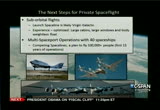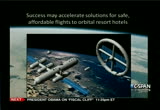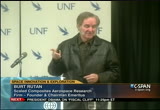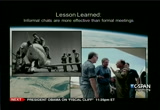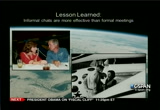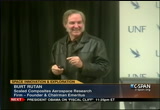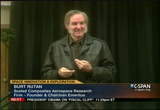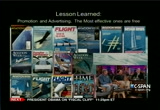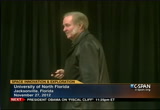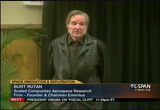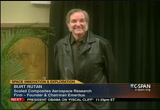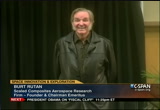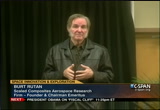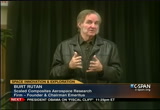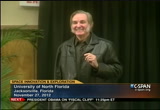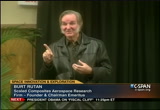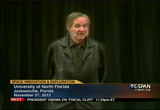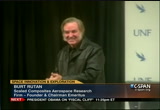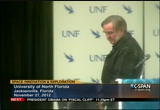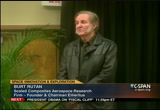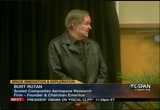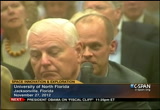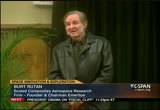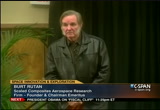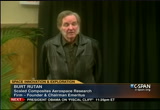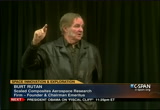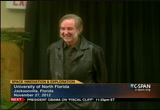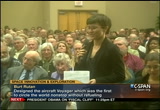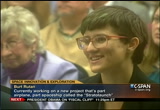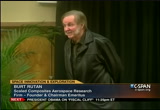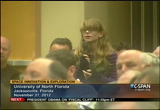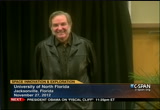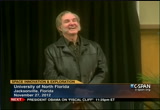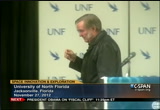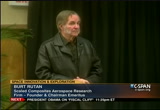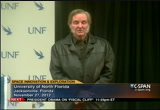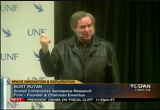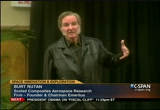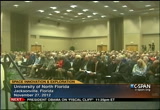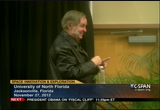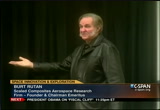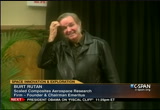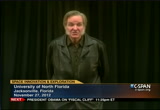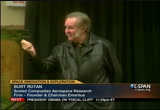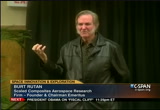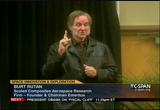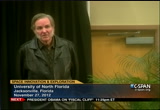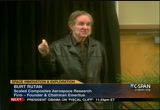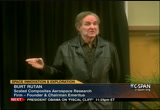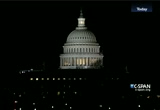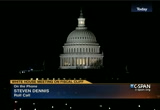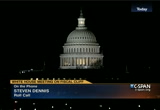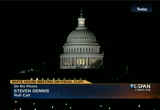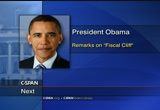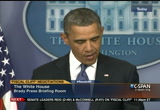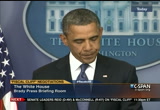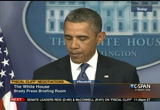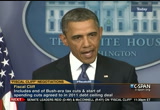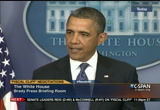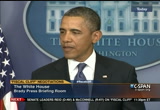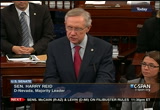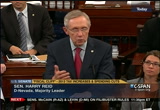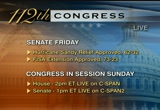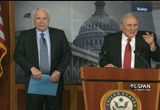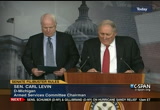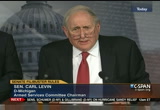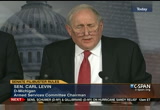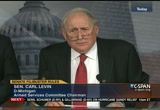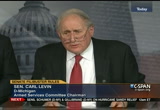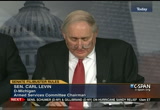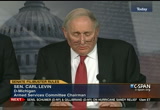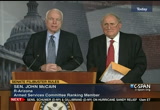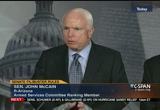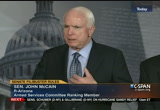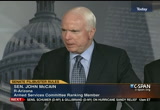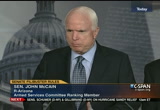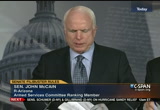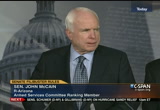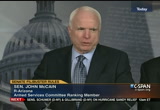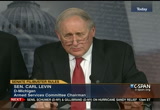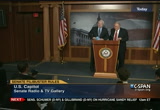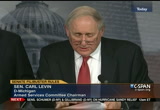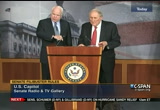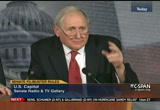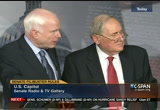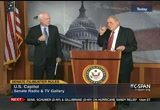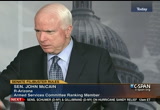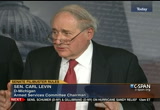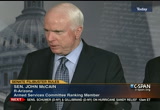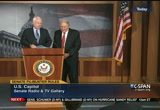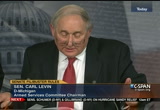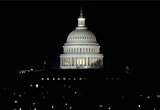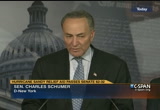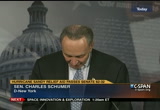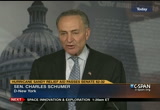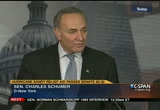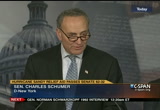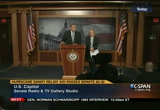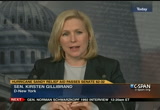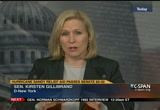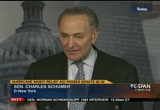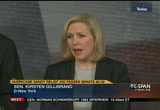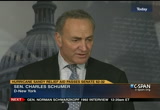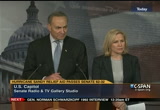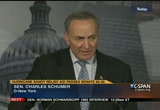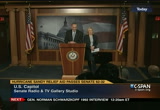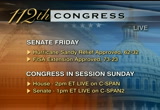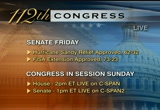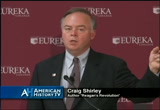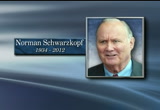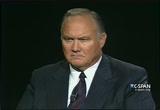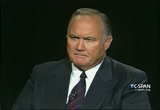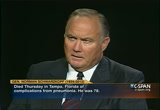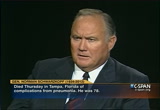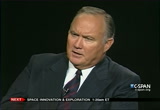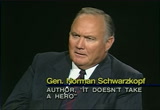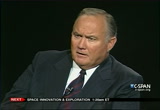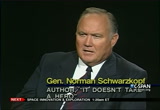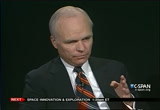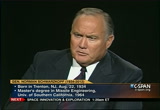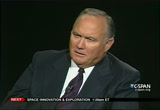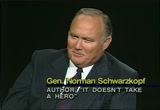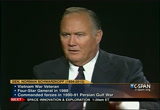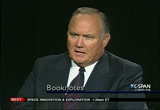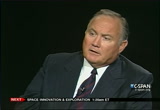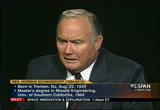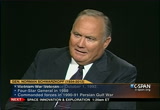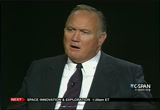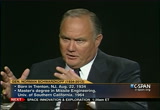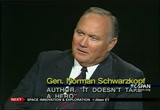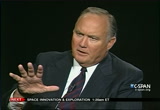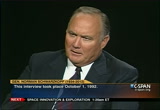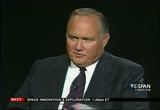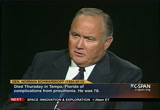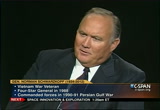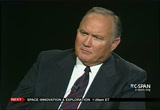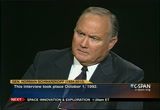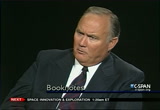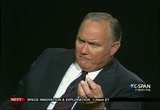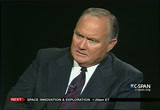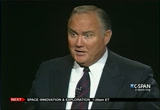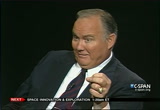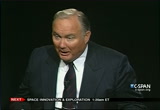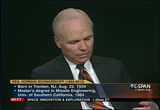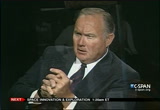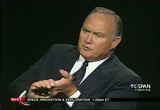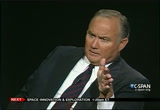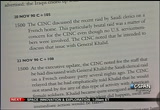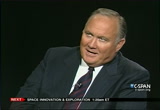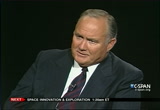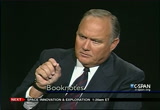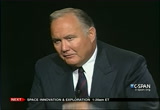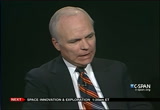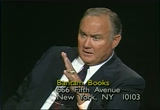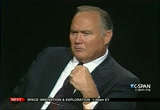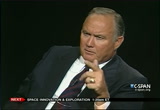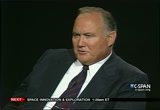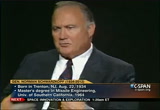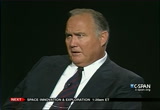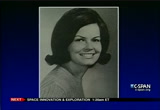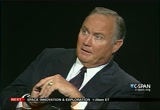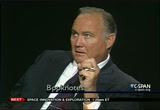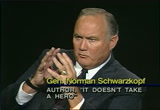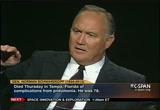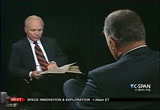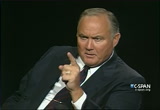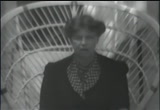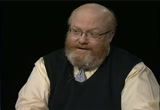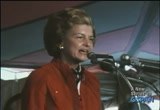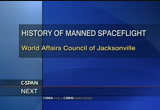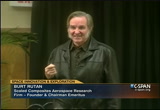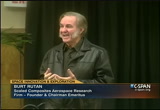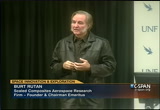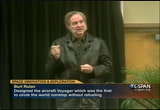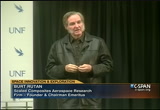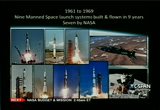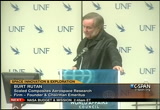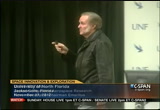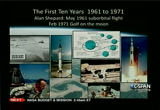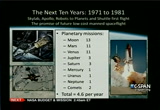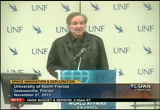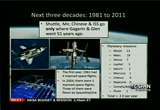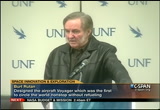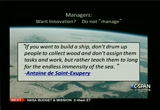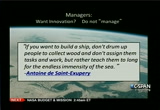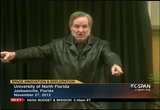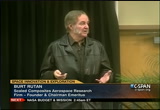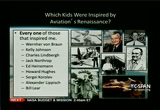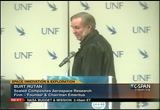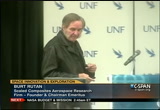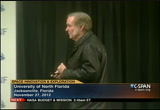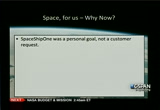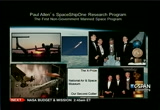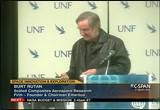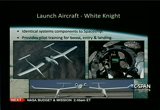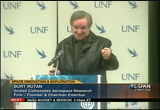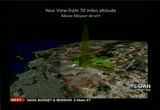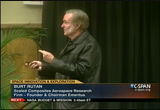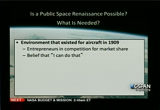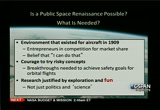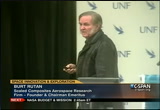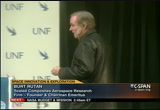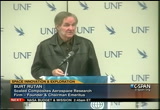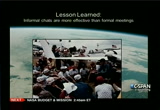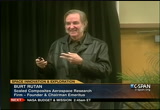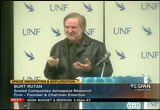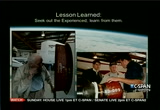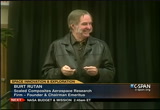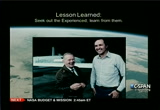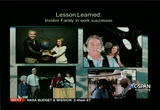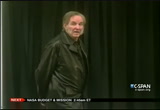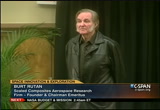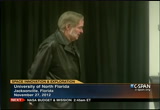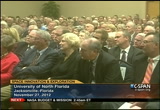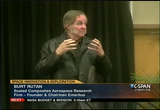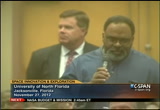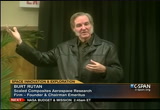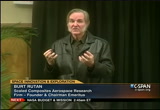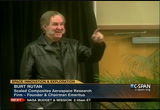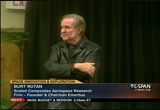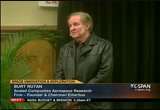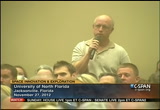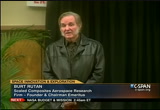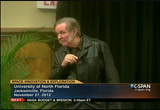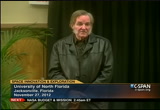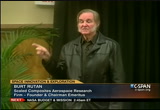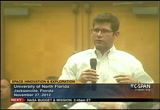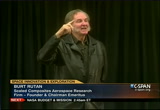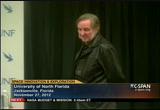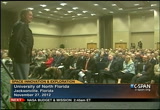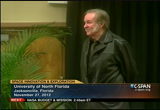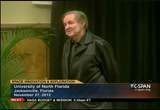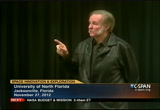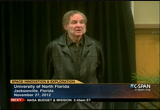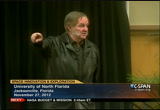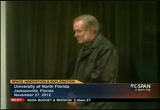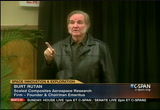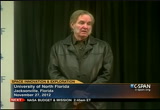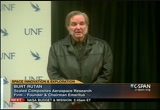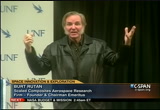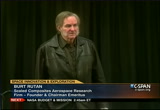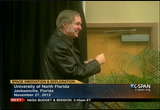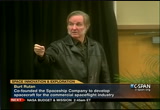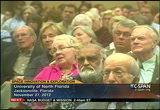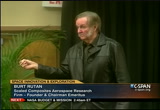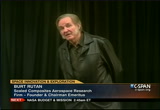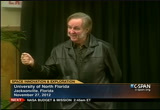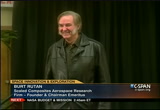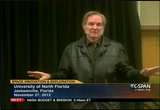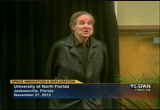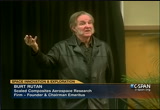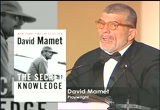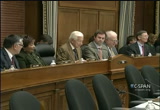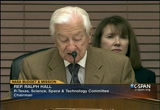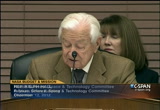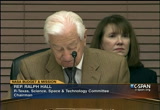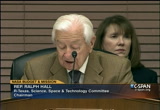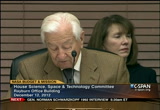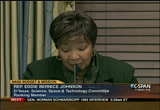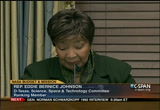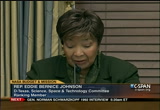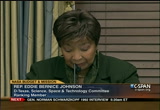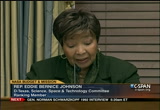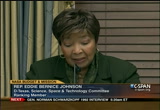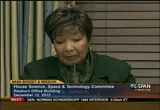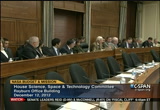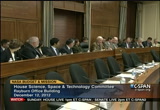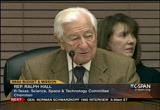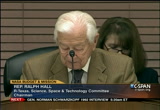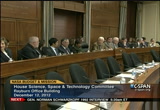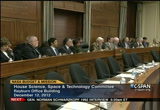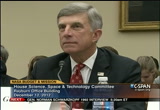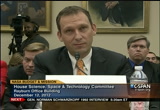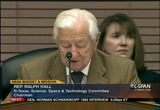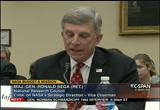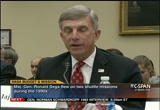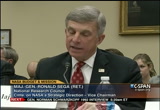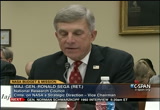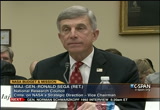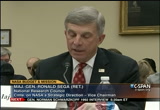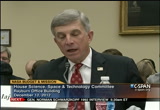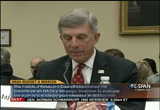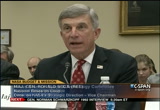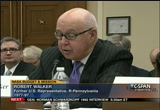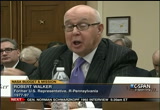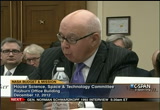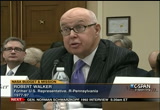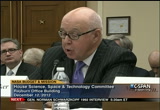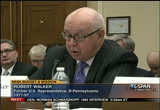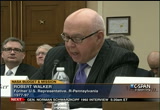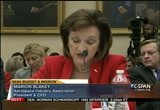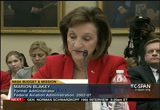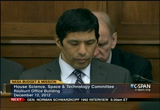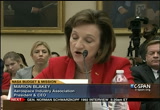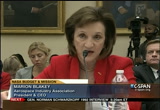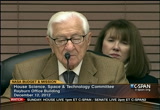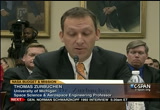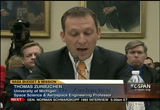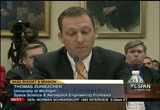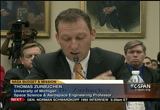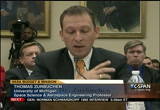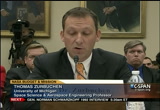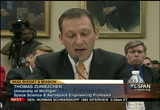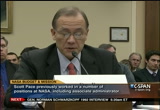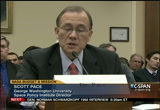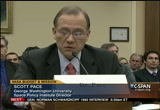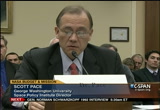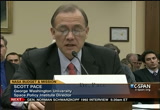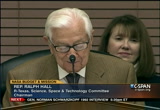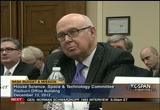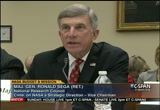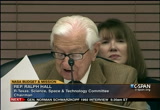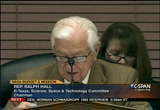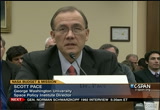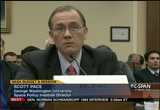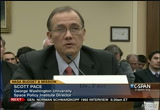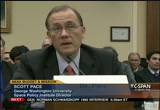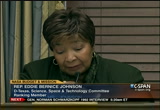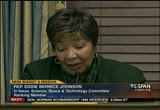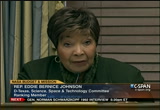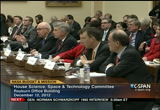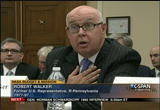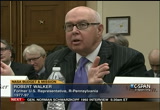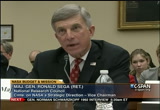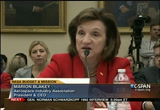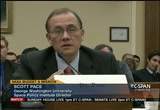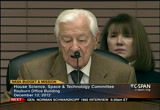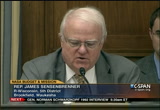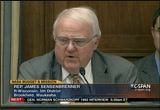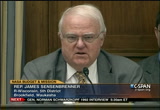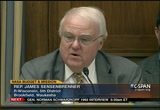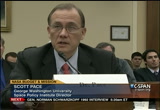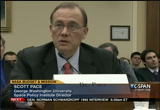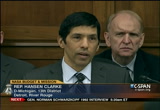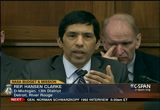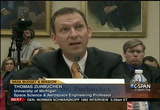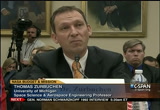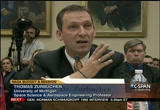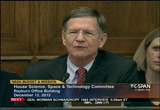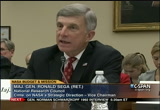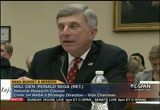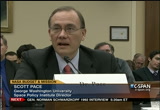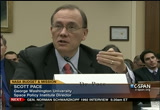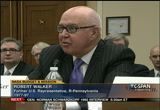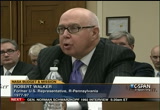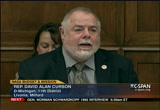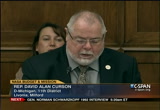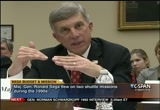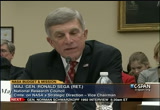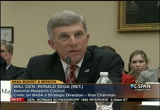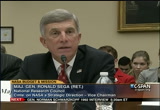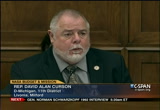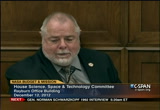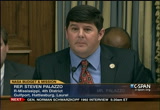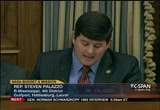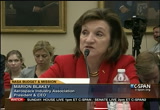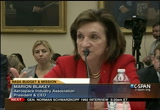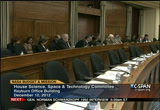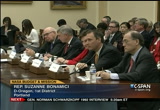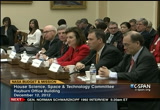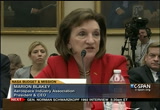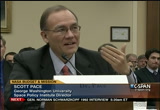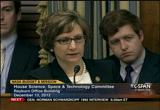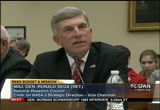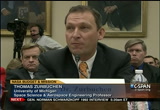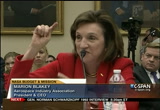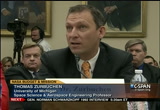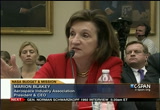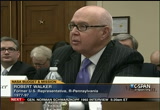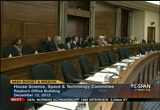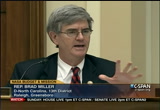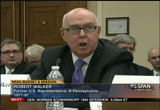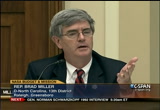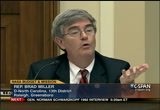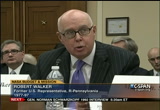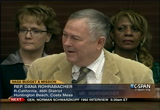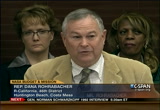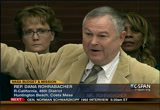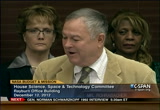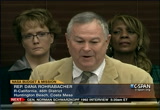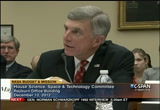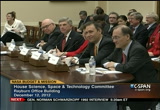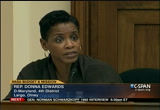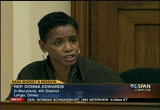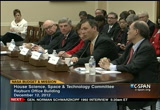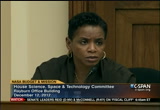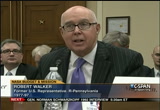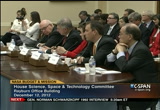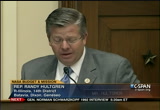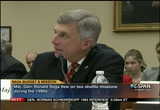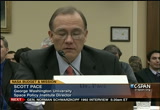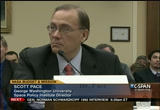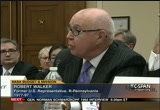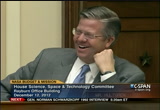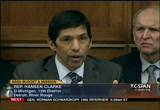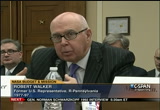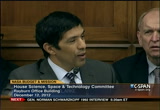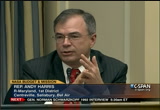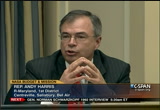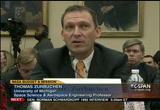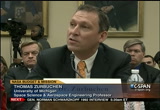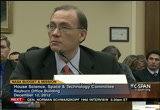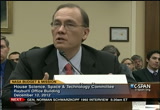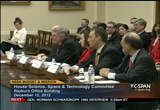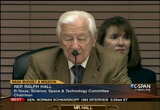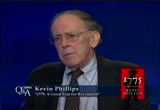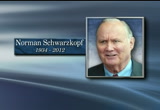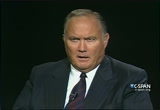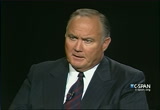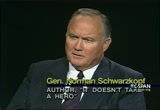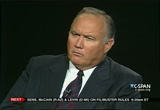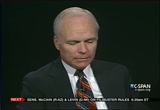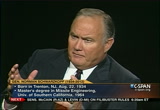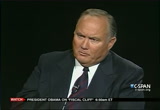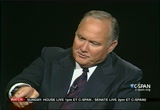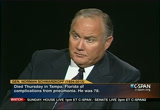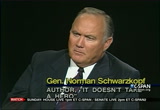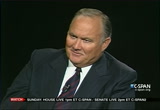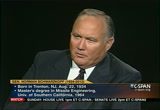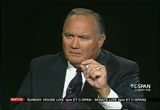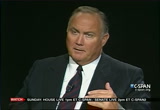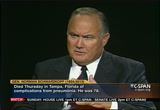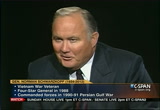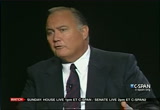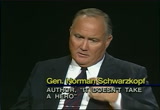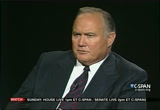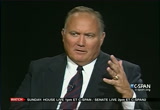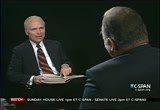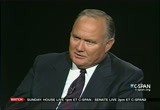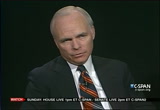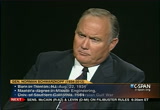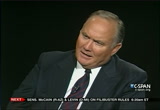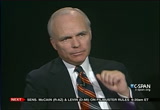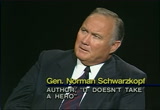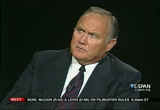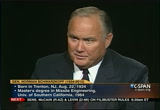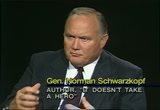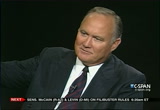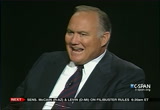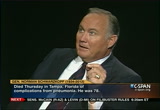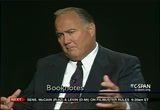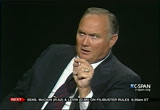tv Politics Public Policy Today CSPAN December 28, 2012 10:30pm-6:00am EST
10:30 pm
is a company producing space ships. they are supposed to build about 40 of them. and the goal is to fly about 100,000 people within 40 years after they get started. by the way, how many people of flown in space? anybody know that? in 50 years -- if that works, i think it will be very profitable, and if it is a very profitable, it will attract the kind of investment so we can do what we really should do in my lifetime, and that is the ability to go to a resort hotel for a couple of weeks.
10:31 pm
this is a few miles. that would be a cool ride. and your short excursion would take you around the moon and back. ok, i'm going to talk about lessons learned in my career. informal chats are more effective than formal meetings. i have always found that it be of a meeting with a lot people and you're sitting down, the meeting is not worthwhile. this is a chat at oshkosh. people want to understand about airplanes. they want to share stories about the airplane they are flying. i said, let's just have a chat. this happens every year for many years. everybody meets at that time every day, and we talk. a couple of need pictures. this movie -- if you have not seen it, it really shows the human parts, the emotions. the introduction dvd has some pieces of the. there is nothing stayed there. there was nothing in the script. everything in that movie is because these people were embedded and they were there
10:32 pm
for years and we did not even notice them. and they did get some neat stuff. and everything -- these are candid shots. here i am in the g-5. i am with the test pilot. we certainly do not agree. he said it up and i would say to the left. on the lower right, that one is a real significant. in most dangerous flight -- mike had to recover from a tail stall. this was a glide like, not a space flight. by the way, the guy on the left, he is now the ceo of scaled. you can see that the discussion -- we are really getting good data back and forth here.
10:33 pm
i mean, he is just about out of the space ship. and things that were said there are probably the most important things, more important than the final record of the flight. when i write my memoirs, which i think i will just published on my website, i will tell you what i am telling the faa administrator over in the corridor here. faa was the one that regulates these test flights. that is an interesting story. i have to go back a few years for a. seek out the experience and learn for them. peering into the rocket nozzle of spaceshipone -- one of the
10:34 pm
rocket scientists came over with von braun in 1946. he died just this last year. i tried to involve these guys. max does not have an engineering degree, but he is the one who designed the shape of the mercury capsule. you know, that dome on the bottom and the los seats? he did that. he designed the german capsule. that is some kind of hero. and by the way, for two and a half years of the first three years of the space program we were covert. we did not tell anybody we were doing at.
10:35 pm
we made an announcement we were going to roll out a new surprise. and i thought of max, because i thought, he ought to come here and tell me whether this would work. i really respect him if he did all that neat design. i said, maps, this is something really new. you love got to tell me -- max, this is something really new. you have got to tell me if this will really work. i said, max, what do you plan to do with the rest of your life? the next day his daughter called me and said, i am bringing him. and he was there for the rollout. unfortunately, and he died a few months later and never saw it live, but it was kind of cool to have max there. this is wrong way corrigan.
10:36 pm
you know, to avoid regulations, he crossed lindbergh. he claims he was going to california. he showed up in scotland. he advised me on how to do around the world regulations for flight. this is a candid picture. believe me. it is not opposed. here i am learning from buzz aldrin. i ran this companies for 30 years. i never bought an ad. we advertise to hire people, but we never advertised products. i have always found -- it is a good lesson -- do something so
10:37 pm
cool that a magazine will put it on the cover. that is much better than a purchased ad inside. another thing, and you won't appreciate this until after you retire, but involve your family. with the things that you do. and called them. tanya -- this picture was taken by me holding the camera up here. she is in the back of spaceshipone. we were taking it to oshkosh. she is the only person to ever fly from lockheed in spaceshipone. that is kind of cool. she can talk about that. giving your family the chance to be involved in things is important. ok, thank you very much. [applause] we will open it up for questions.
10:38 pm
>> [indiscernible] >> hello? yes. i was wondering how you solve the reentry issue in terms of the heat buildup? >> heat shield reentry is not an issue -- it is especially not an issue for sub orbital space flight. when you go to support it, you are at mach 2.5. when you fly a suborbital flight, where you are giving people four minutes total weightless, seven minutes of black sky -- by the way, the
10:39 pm
most expensive way to fly in space permanent -- when you do that, you do not even have to go to mach 4. it is very nonlinear. the heating is a lot more than twice. bottom-line, it if we flew with no thermal protection at all, it was scorched the paint and damaged the outside of the composite material and that is all it would do. so we only have 14 pounds of thermal protection. it would last forever. it just turns brown and does not char. >> thank you for being such a rock star engineer. i really look up to that. you have spoken this whole evening about inspiration and the fact that everyone that you
10:40 pm
look up to was inspired at some time. i wonder if you have your own branch whose sole purpose is to inspire youth? >> you know, i am very familiar. i was judged at the first u.s. first competition. i was invited to be a judge and the competition was just too high schools in manchester the first year. so i am very familiar and supportive of that. i gave a talk at a brand new charter school in my home town where they are starting off kids with robotics between the ages of 6 and 13. boy, are they excited to go to school.
10:41 pm
let's see. the big problem that we had that we never could even do a student summer co-op program -- the problem is, our company was so small that it was hard for us to build barriers from one project to another. everyone of them essentially is nonpublic. richard branson's program, he tells everyone about it. in almost every other program, they don't want to leave that information. if you bring in some kids for the summer, they will invariably tell their classmates when they go back to school things they are not supposed to. we always thought that was too risky and we were never able to do part-time or summer hire. we never did get into the education thing at all. we are focused on doing a job. my point on education is that there is something
10:42 pm
revolutionary that needs to happen. if you look now in the internet age and realize the rate at which a student downloads information -- the people who are really smart are bored. i think within maybe 20-25 years, you won't see a classroom typically like we do, where you see everybody goes to a classroom. it is for that reason, it is not a good thing to teach people who are going to be innovators
10:43 pm
later on. next question. >> thank you very much for your talk. what skills, academic, etc., do you need at early ages to facilitate creativity and innovation? how can parents and schools shape these attributes for kids? >> in answering that, i am going to focus on word that you said. you said cultivate. the point i have tried to make is that if things are going around in the world outside of the kid's community, outside of
10:44 pm
his local interface and outside of his school, if he sees wonderful progress happen, that is so different -- that is why we are intelligent species. animals don't see big differences during a lifetime. humans do. i don't think uncultivated -- if you try, then you do what nasa is doing with education. they are sending old astronauts and their to inspire kids and they are going to run out of the old astronauts, the ones that really did find things. another 15 years and nasa cannot even do that anymore to inspire. what is going to make it happen is for things to happen outside of the education system and
10:45 pm
then kids themselves are inspired in themselves. the ones that have the creativity, the drive, the passion. they will go out and do it themselves. i was never taught to be creative. i don't know how to teach anyone to be creative. all i can say is that if wonderful things happen around you when you are young, especially, you are more likely to be creative when you are an adult. >> looking down the road, do you foresee a lifting crap that will help us go to mars, let's say? >> when i was a kid, in 1955, i was 12 years old. werner von braun and walt disney world and disneyland television. i did not have television, but a neighbor did. i went over and watch that and it was the most impressive thing i ever saw.
10:46 pm
keep in mind, this was before sputnik. and he was showing how we know how to go to mars, and we will send hundreds of people to mars, and here is the model, and here's what it will all look like. wow. by the way, go back and look at all that stuff. it is really cool. i have a college textbook that talks about mars from that time period. of course there are plans there because the telescope sees color changes. we may never know if there is intelligent life on mars. now here is a guy saying we can go, and i am a 12-year-old kid watching television. wow, you talk about something exciting. man, i am going to try to go, right? well, now, what does a kid do today? nasa has really screwed up. they send these robots and they
10:47 pm
land them out in the desert. they don't let any of them downtown. [laughter] and the kids, me included, are saying, why do we want to go to mars? it looks like the mojave desert. it looks just like where i spent the last 46 years. next question. >> could you comment on the commercial space like contractors that have been contracting with the federal government to replace the shuttle? and could you comment on where the commercial space ports of the future will be located? >> well, for suborbital manned spaceflight, they can use any airport with a 12,000 foot runway. branson is considering doing it in an isolated place in new mexico.
10:48 pm
i tried to talk him into doing it in a place where there is an ocean and something worth looking. at any rate, his plan to put spaceports in five or six different countries, he wants to do one or you can let people see the northern lights during your space flight. so he has some really neat ideas about where it could be done. when you look at where funds are available for a space port, there is one planned in dubai. there is not one affordable enough to fly into orbit, so i suggest that we had better solve that problem and then think about what a space port would look like.
10:49 pm
>> your thoughts on using model aviation as a funnel for youth to get into aircraft engineering, because your friends at the faa are trying to lump us then with the uab program. >> not just the faa. they are now in the air force debating how do you give an air medal to a person that flies a drone and kills people in more, and that night goes to las vegas show and sleeps with his wife. that is actually happening today. those drone things are flying just outside of las vegas.
10:50 pm
is that a hero test pilot? that is a big debating thing right now in the air force. it is not just faa drone issues. as far as can unmanned operate in the u.s. system, there are ways to do that. they are extremely restrictive. a pilot must be able to look outside and sea traffic and then turn so he does not hit it. they are still working that problem. essentially what happens now in the u.s., the drones will fly in a restricted area and climb up above for all the other traffic is, and then it can go anywhere wants.
10:51 pm
next question. >> first of all, i need to apologize because there may be people in this room who can answer it already for me. we have a former decommissioned military base called cecil field. can you hear me? it was under my impression that it was trying to maintain its viability by trying to become a space port. >> what did you call it again? >> cecil field, in florida. my question is, if it is to succeed, how can compete with the kennedy center, which is three hours away, which has essentially been trying to do the same thing since the space shuttle was the commission?
10:52 pm
>> let me tell you, the most important thing about air launch of a spacecraft, and i am working now -- by the way, the biggest airplane in the world is able to launch satellites, it could operate out of the mojave airport. it does not have to operate at vandenberg or the cake. elon musk tried to operate out of brandenburg, and it was so difficult. i don't have time to explain why. you can google it and find out. he left and bought an island in the south pacific in order to launch. now that he is getting billions of government money, now he is able to work out of the cape. he does his falcon nine launches there. i think having the freedom to do this without the standing army that thinks they are there to regulate you, i think that is
10:53 pm
extremely important, particularly on cost. one of the reasons that the shuttle became so expensive in the early days is they started it too soon after apollo. all those guys seemed to think that they still had jobs to do. maybe i should not have said that in florida. [laughter] but let me just speak for commercial suborbital space flights. those absolutely will not be done on any government sites. the affordability is just totally out of the question. >> hello. thank you for coming this evening.
10:54 pm
i have been following your career since voyager with some degree of enthusiasm, so it is wonderful to see you in person. my question is directed at commercial space flight, but not for space tourism, but for intercontinental and across continental travel. i want to know, in your mind, what do you think are the largest barriers to creating a cost-effective platform to actually design, build, and market a vehicle that can basically be the times and speeds that the concorde did? >> first of all, let me explain to you. richard branson, he always ask why can i not use what you were doing here to fly passengers to sydney in half an hour. the flood of a spaceship includes acceleration of less than two minutes, probably closer to 1 minutes, and then when it reaches the atmosphere
10:55 pm
it decelerates over about a minute. so you have that picture. if you try to do that to fly from los angeles to sydney, australia, your parabola would go many times higher than the international space station, and you could not survive reentry. so what you have to do is either breathe air in the atmosphere, and which -- but we have not run them long because they melt. that is why all these hypersonic jets have only run for seconds, not minutes or hours. another way, of course, is to go on up to a low altitude, like 200,000 or 300,000 feet. you would spend most of the trip decelerating in the atmosphere, building up all this heat.
10:56 pm
so it does not make any sense to use rocketry to go to sydney, because the physics do not make any sense. [indiscernible] >> i was not thinking about starting a company when i did the wind tunnel. that was the question. i was just trying to build an airplane for myself, and i was afraid to fly it, based on what i had learned in school. i could not afford to do wind tunnel testing, so i did build a model. i build a unique kind of wind tunnel mouth and i put the whole rig way above my it dart station wagon, and i was seen driving at night at 80 miles an hour out in the desert.
10:57 pm
it had nothing to do with my business. i did that when i was just trying to learn enough so that i would not be too afraid to build my first airplane. can we get a mike for her? you will not be heard by c-span if you do not have a mike. and i know you want to be heard by c-span. i don't, either. i shouldn't have said that. [laughter] you can say anything when you are retired, right? >> i know you are disappointed with lack of youth interest in general. >> move closer so i can hear you. >> i know you are disappointed with the lack of youth interest
10:58 pm
in aerospace engineering. >> for someone who really wants to do it, in spite of the fact that there is nothing going on? great, go for it. unfortunately, here is what i think is a problem. it is not the students' fault. after we had done these wonderful things that first 10 years, if we had a commercial for students are whatever, great ideas, it would have a reasonable chance of getting funding, because these things are possible. i can understand your desire, particularly since i know that you will do a lot more in your lifetime than you think you will right now -- i can
10:59 pm
understand your desire, but what you will run into is they will look at, well, how much is this going to cost, how long will it take? let's study it. if they study the last 30 years, they will say, i am sorry, i enjoyed your passion, but i certainly cannot invest in this, because it is impossible for you to do something quickly so i can get a return on investment. that is the environment, really, and has little to do with the overall world business environment. it is a question of confidence. the insurance company, they did not think it could happen. that is the same reason, the same pressure that will keep you from getting funding. that being said, find a way.
11:00 pm
do it. when i said he will do a lot more, i believe that every person of your age or younger, every person in the earth your age or younger, can go into orbit in his lifetime if he wants to. think about that. have people been able to say that? or at least two space. >> i wanted to thank you for taking time out of your day to come and talk to us. have you ever grown tired of your craft, and if so, how do you continue and improve your drive toward your career?
11:01 pm
>> have i grown tired in designing and building airplanes? >> yes. >> you know, i thought i did when i retired. i spent the last four months of a 46-year career working 70 plus hours a week, working in the shop. i wanted to get the flying car, that new design, flying before april 1, when i was going to retire. i worked on christmas day, a few months before i retired, because i had to get that done. so i worked very hard. and it did fly the day before i retire, which was kind of cool. the next day, a couple of days later, i am driving north, and i said, you know, i started my
11:02 pm
career working very hard because we had o1a priority testing during a hot war. i can remember working all weekend and not even going home, because i was to get data to vietnam during the siege of -- our ability to supply equipment without landing, i worked so hard on that because our troops were in trouble. that is just one example and kind of the whole career was like that. i did not realize i was tired until i retired. i was not driving, my wife drove, and i just relax. and i said, you know, i really am tired. and i didn't do anything in engineering or airplane design for more than a year.
11:03 pm
cold turkey. and then i had this idea for a new plane. >> i have a quick question regarding the most recent jump by felix baumgartner. how the ec that driving the privatized space industry and influencing kids that want to get into the industry? >> what was it -- how do you see that driving the privatized space industry? >> it was done many years before. what baumgartner did was a milestone only because he went
11:04 pm
high enough so that he actually fell at supersonic speed. he broke the sound barrier with his body. other than that, he was just doing a jump 20% higher than the last jump. so he did a milestone, and history will show that he was the first one to go supersonic with nothing but a parachute and a pressure suit. ison't know that there anything really earth shattering, technically, about that that will lead to other breakthroughs. there might be on some space to design or whatever, but i am not aware of anything that you are referring to. >> you spoke to us about nasa's great accomplishments and some of its shortfalls. if you have the ability to
11:05 pm
council president what direction to give nasa, what would you ask him to do? >> the current president, i don't think that would go well. [applause] how would i advise a president who is not interested in nasa doing better technologies and doing exploration like it did in the 1960's? is that a better question? i was telling him that the public's has an expectation for
11:06 pm
this $18 billion, that you spend a large percentage of it, maybe even a large majority of it, on pure research. in other words, i want you to take my tax payer money and go out and try to do something that you may not be able to do. in fact, i call it research only if half the people think is impossible. if most of the people think it is possible, then you are doing development. you are not a research organization. if you took anybody out of nasa, out of engineering, i don't care if they were head of nasa or a secretary or a shop guy, when jfk got up and said 21 days after alan shepard made this little flight, that we are going to go to the moon before
11:07 pm
1970, everybody jumped up and down. you know why? multi-year funding. wow, we are going to have jobs for nine years. yes, we can do it. this is cool. we will beat the russians. everybody was real excited. grab any person, taking into a private room and locked the door and say to him, what is your net worth? tell me what you are worth. and then ask him a question. would you bet everything that you are worth that we will actually do that, go to the moon and back safely before 1970? you would have gotten a small minority. therefore, by definition, half the people thought it was
11:08 pm
impossible, and therefore, you had a right to gullett research. if nasa did most of its expenditure on things that half the people do not think is possible, we would have enormous breakthrough, and we would be going to the moons of saturn instead of not going to the moon that we went to 50 years ago. [applause] >> it is difficult for me to stand up. when orbital flight becomes commercially public and viable, who will be flying them, military pilots or commercial pilots? if they are commercial pilots, who would be trained them, and where would they be trained?
11:09 pm
>> orbital flight, that is a good question. i had a chart that i did not use today. one line showed the speed of the top performance military fighter, and then another line that showed how fast you could go as a public person, buying a ticket. and throughout history, first of all, when i was 14, the black line with all the way from subsonic orbit. military went up a lot, and commercial went up a lot.
11:10 pm
even when sr-71 and concord were flying, the military was faster. well, guess what? there is a possibility that in the next five years or so, for the first time, anyone here can buy a ticket and you can go faster and higher than any military person flying the most highest performance military fighter. and that has never happened before, has it? and i think that will piss them off. and you know why? look at the first iraq war. we had air superiority in 32 hours, so why do we need a faster, better fighter? there is not a requirement out there. so the military planners don't
11:11 pm
ask lockheed to do something that they probably could do, because they don't need it. it was not the air force that asked billy johnson to build an sr-71. it was the cia. there is no way the military would have funded such a program. it is really leadership thing and a decision thing. jfk knew nothing about rocketry. maybe he watched disney television, too. but he challenged them to do
11:12 pm
something that was impossible. and he was smart enough to make that challenge. the problem that we have now, especially with earth at administration, they are not smart enough to challenge the american people and allow them to be exceptional. that is the main reason that we are not the success that we once were. [applause] >> out of all that you have done, what gave you the most fun, the greatest pleasure? >> that is like someone asked me what is my favorite airplane, and i always say the next one. i stopped answering that in 2004, because i realized that spaceshipone, and what we did
11:13 pm
with a tiny amount of money, we developed our own rocket engine, for the simulator and avionics -- the whole rocket test facility, we did all of that. it was so far above, not just the public understanding that it was a cool thing, but in house, it was an enormous feeling of accomplishment. paul allen did give us some of that $10 million, and i was able to hand out that money to every employee that worked with me. i gave them some of that $10 million. when we flew to space and had
11:14 pm
to put payloads in there because we were not flying people, i gave envelopes to every employee and i said, put something in here that is yours, that is personal to you. i will never even look at it. and we will bring it back and give it to you, having flown in space. and everyone of my employees put pictures of their kids or whatever. i flew my slide rule from college. i have a lot of stuff that has floated in space. do you know how much personal stuff you get to take along? what nasa lets you take? they won't let you take your
11:15 pm
girlfriend or your dog. what they let you take is about the size of three wallets. my employees on stuff that floated in space, and i think that is really cool. because of that, and the fact that in 2004, by the criteria of how many world newspapers cover the story above the fold on their newspaper, above the fold is the big news of the day. how many world newspapers cover the story, spaceshipone's first space flight in june of 2004, was beat no. 2 story of the entire year. by that criteria, it would have been number one if in 2004 we
11:16 pm
had not drug saddam hussein out of his spider hole. i do not believe i will see anything as rewarding as what we did in house, with that team that was able to do that. >> general aviation is in the doldrums again, even though we seem to have a new generation of aircraft out there. do you see a pathway for general aviation to be generally accessible to the public in the future? >> i did not understand the first part of the question. >> i was saying general aviation is again in the doldrums. but we do have relatively new
11:17 pm
generation of aircraft out there. >> well, we really don't. in 1997, i thought we were going to have one. the vision that we started off eroded so badly into an eclipse, which is not something interesting. it is just a scaled-down learjet. when he was trying to do was make an airplane that would cost about $85,000. that would have revolutionized general aviation and it was technically feasible. it required research, but i think that research would have worked. that would have been
11:18 pm
revolutionary. other than that, i don't see anything really significant in general aviation since the 1950's, really. look at the fighters today. look at the airliners. the 787 and the airbus 380, the newest airliners, they don't go any faster or any higher than they did in 1968. the fighters today are not faster or go higher than the fighters we had in 1958. they got better radios, and they are stealth, but all airplanes were stealth before somebody invented radar. [laughter] so there has not been really
11:19 pm
breakthroughs in performance in any of those categories of airplanes. maybe some of these youngsters here will do that. [inaudible] >> tonight, the latest on the fiscal cliff negotiations in washington. we will show you remarks from president obama at the white house and senate majority leader harry reid and mitch mcconnell on the senate floor. first, an update on where negotiations stand after the meeting between president and congressional leaders at the white house. >> steven dennis joins us from the role call as a white house reporter. stephen, how did the meeting between the president and congressional leaders go? >> i think it was a meeting
11:20 pm
where they may be set the framework for getting a short- term deal to avert tax increases for most americans, extend unemployment benefits, and maybe take care of a few other small things. at this point, it is a race against the clock and it is up to harry reid and mitch mcconnell and the senate to see if they can have a bipartisan compromise. the president said if he cannot come up with something in the next couple days, he wants harry reid to bring a bill to the floor that would do with the president wants to do, which is tax increases, extend unemployment benefits, etcetera, at least get a vote on it. harry reid has announced that he will prepare that bill and in the meantime he is trying to reach agreement with mcconnell that would be a bipartisan bill and hopefully get through both chambers in time to beat the
11:21 pm
clock for 2013. >> were any details discussed at the meeting? >> they did sort of go over some outlines to how they could get to a deal, but the speaker of the house john boehner made it clear that he is only going to take any action if the senate first passes a bill. the president and senate democrats had been asking the house to vote on a bill that the senate passed months ago for people making under a quarter million dollars, and the speaker has ignored that bill. basically, the ball is now in the senate's court, and the president was -- even though they said he was modestly optimistic they could reach a deal, he was pretty peeved that we are once again up against the deadline and congress seems to be serially and capable of doing anything unless they are up against a deadline. the president says that has to
11:22 pm
stop and it is unacceptable to the american people. >> why did that task fall to senators reid and mcconnell? >> if you look at the past 4, five major impasses in the past two years, where there have been these impasses, it has largely bend mitch mcconnell and harry reid who have cooked up something towards the end that covered it -- that averted this. they averted a payroll tax hike last december. it is sort of an interesting fact that the senate, even though it is normally seen as a body that cannot get anything done, it has a little bit more by partisanship right now and there is more incentive for the senators to try to get something done. the house members are more pulverized. they have gerrymandered districts. they're worried about primaries more than general elections, and
11:23 pm
i think the best case scenario is the senate craft a compromise that both parties can live with and is sort of take it or leave it for the house up against the deadline, and you figure enough house democrats and republicans come together to send it across to the white house. >> steven bennis, white house reporter for roll-call, thank you so much for your time. >> absolutely. >> president obama issued a statement of the status of fiscal cliff negotiations, calling the meeting good and constructive, and he said that senate leaders every read and mitch mcconnell will try to work out a bipartisan compromise bill this weekend. if no deal could be reached, he wants senate majority leader read to introduce a deal that would extend unemployment insurance,. a middle-class tax hike, and the president spoke from the white
11:24 pm
house briefing room. [captions copyright national cable satellite corp. 2012] [captioning performed by national captioning institute] >> good afternoon, everybody. for the past couple of months, i have been working with leaders of both parties to try to forge an agreement that would grow our economy and shrink the deficit, a balanced plan that would cut spending in a responsible way but also ask wealthy americans to pay more and protect our middle-class and everyone striving to get into the middle class. i want to get this done. it is the right thing to do for our families, businesses, and our economy, but the hour for immediate action is here. it is now.
11:25 pm
we are at the point where in four days every american's tax rates are scheduled to go up by law. every americans' paychecks will get considerably smaller. that would be the wrong thing to do for our economy, it would be bad for middle-class families, and it would be bad for businesses that depend on family spending. congress can prevent it if they act right now. i just had a good and constructive discussion here at the white house with leadership about how to prevent the tax hike on the middle class. we may reach an agreement that can pass both houses in time. senators reid and mcconnell are working on such an agreement as we speak, but if an agreement is not reached in time between senator reid and senator
11:26 pm
mcconnell, then i will urge senator reid to bring to the floor a basic package for an up or down vote to protect the middle class from an income tax hike, extends the vital lifeline of unemployment insurance to 2 million americans looking for a job, and lays the groundwork for future cooperation on more economic growth and deficit reduction. i believe such a proposal could pass both houses with bipartisan majorities as long as those leaders allow it to come to a vote. if members of the house or senate want to vote no, they can, but we shall let everybody vote. that is the way this is supposed to work. if you can get a majority in the house and in the senate, then we should be able to pass the bill. the american people are watching what we do. their patience is already thin. this is déjà vu all over again.
11:27 pm
america wonders why it is that in this town you cannot get stuff done in an organized timetable. everything always has to wait until the last minute. we are at the last minute. the american people are not going to have any patients for a politically self-inflicted wound to our economy. not right now. the economy is growing, but sustaining that will require elected officials to do their jobs. the housing market is recovering, but that could be impacted if folks are seeing smaller paychecks. the unemployment rate is the lowest it has been since 2008. you are seeing businesses and consumers hold back because of the dysfunction they see in washington. economists, business leaders think we are poised to grow in 2013 as long as politics in washington do not get in the
11:28 pm
way of america's progress. we've got to get this done. i want to repeat -- we had a constructive meeting today. senators reid and mcconnell are discussing a potential agreement or we can get a bipartisan bill out of the senate over to the house and done in a timely fashion so we met the december 31 deadline. given how things have been working in this town, we always have to wait and see until it actually happens. the one thing the american people should not have to wait and see is some sort of action, so if we do not see an agreement between the two leaders in the senate, i expect a bill to go on the floor -- i have asked senator reid to do this -- put a bill on the floor of that make sure taxes on the middle class does not go up, that unemployment insurance is available for 2 million people,
11:29 pm
and it lays the groundwork for additional deficit reduction and economic growth steps that we can take in the new year. let us not miss this deadline. that is the bare minimum we should be able to get done. it should not be hard since democrats and republicans say they do not want to see taxes go up on middle-class families. i have to repeat -- outside of washington, nobody understands how it is that this seems to be a repeat pattern over and over again. ordinary folks -- they do their jobs. they meet deadlines. they sit down and they discuss things and then things happen. if there are disagreements, they sort through the disagreements. the notion that our elected leadership cannot do the same thing is mind-boggling to them. it needs to stop. i am modestly optimistic that
11:30 pm
an agreement can be achieved. nobody will get 100% of what they want. let us make sure that middle- class families and the american economy and the world economy are not adversely impacted because people cannot do their jobs. thank you very much, everybody. >> now senate majority leader harry reid and mitch mcconnell talk about working on a deal to avoid the so-called fiscal cliff. they spoke on the senate floor after a meeting with the white house with president obama and leaders from the house. >> what the plan is that everyone knows we have been to the white house, we have had a constructive meeting. we certainly hope that
11:31 pm
something positive will come from that. the republican leader and i and our staffs are working to see what we can come up with. we should not take a long time to do that. i think it would be to everybody's interest if we were not in session tomorrow. my plan to comment at 1:00, we have an hour on our previous agreement that we have. there is an hour of debate on that, we have a vote. we have another vote that has been set up, that is a simple majority. that you are talking about sunday? >> yes. >> we will probably start those votes a little after 2:00. and then for us, we will have another caucus. hopefully by that time, we will have made a determination whether we can do something on the floor in addition to what we have just talked about. i think we need that time to
11:32 pm
have everybody kind of step back a total bit. is some what complicated. i think it was a very positive meeting. i think it was a very positive meeting. there was not a lot of clarity in the meeting. everybody knows how important it is. it was a very serious meeting and we took an extended time. the white house. we are engaged in discussions, the majority leader and myself and the white house, in the hopes that we can come forward as early as sunday and have a recommendation that i can make to my conference and the majority leader can make to his conference. and so we'll be working hard to try to see if we can get there in the next 24 hours. so i'm hopeful and optimistic. mr. reid: i'm going to do everything i can. i'm confident senator mcconnell will do the same. but everybody, whatever we come
11:33 pm
up with is going to be imperfect. some people aren't going to like it. some people will like it less. but that's where we are. and i feel confident that we have an obligation to do the best we can. that was made very clear in the white house. we're going to do the best we can for the caucuses that we have and the country that's waiting for us to make a >> friday, the senate approved a $60 billion aid package for hurricane sandy believes that now heads the house. they also approved a five-year extension of fisa, the foreign intelligence surveillance act, which allows the government to conduct surveillance on foreign targets without individual court orders. that bill heads to the president was expected to sign it. as for the congressional leaders, they met with the white house.
11:34 pm
afterwards, the president told reporters that senate majority praetor -- senate majority leader harry reid and minority leader mitch mcconnell are continuing to try to come to a agreement. if they did not, the president has asked senator reid to introduce a basic package for an up or down vote. they will continue legislative business sunday. the house live at 2:00 p.m. sunday, with bullets as early as 6:00 p.m. eastern. the senate is in at 1:00 p.m. eastern, live on c-span2. >> also today on capitol hill, senator carl levin and john mccain of for their ideas for bypassing filibuster's to take up legislation, a counterproposal to another plan that would have to change the senate rules to a simple majority vote. it spoke to reporters for about half an hour. -- they spoke to reporters for about half an hour.
11:35 pm
>> give a bunch over here, kathleen, let them pass it out. ok, sorry for the delay. we thought we had a vote, but there was no vote. senator mccain and i are part of a group of eight senators who have been working for about a month to come up with a proposal for our leaders and our conferences, which will hopefully overcome the gridlock that has so permeated the u.s. senate. the eight senators who have participated in this effort are myself, senator mccain, senator schumer, senator alexander, senator cardin, senator kyl, senator prior, and senator barasso. it is a bipartisan proposal, and we believe strongly we must
11:36 pm
reform the senate's procedures if it is going to do business more efficiently and fairly. there are many parts to our proposal, i would say the key number-one part is to give the majority leader options to overcome the filibuster and the threat of a filibuster on a motion to proceed. that has been the greatest problem around here in terms of getting to the business of working on bills. we cannot get to bills if there is a filibuster or a threat of a filibuster on a motion to proceed, which has happened dozens of times and just takes a week to overcome that threat just to get to debate the bill. we spent days and days and days
11:37 pm
trying to get a bill to the floor so it can be debated. our number one goal was to give the majority leader options to overcome that motion to filibuster to proceed, and we have two options that he has under the rules. the new options, number one, would be that there would be four amendments that would be guaranteed right up at the beginning, two for the majority, two for the minority. you would see how that would work. and then after that, those four amendments are disposed of in the order indicated. we would then be right back on the regular order of the senate. those amendments -- there could
11:38 pm
be a motion to table those amendments -- they could be filibustered, they could be offered side by side to the senate, so the republican manager could offer the amendment and then the democratic manager could offer an alternative to that first amendment of the republican manager. then it would go to the republican leader to offer an amendment, and then the majority leader would have the final so- called privileged amendment. they could be themselves filibustered. they could be offered side-by- side to the senate. the republican manager could offer an amendment and the democratic manager could offer an amendment to that first amendment of the republican manager, and then it would go to the republican leader to offer an amendment. then the majority leader would have the final so-called privilege. we do all this by the standing order of the senate, which has the same effect as the rules, but requires 60 votes to be adopted. and we would sunset the standing order after two years so we could see how this worked out. there is another alternative, another option available to the majority and the minority leader. then, it would go immediately
11:39 pm
to the bill. it would be agreed on by the two of them. in addition to what i have just described, the ways of getting the bill passed the blockages that exist here, there are other parts to this proposal. we would expedite going to conference. all three motions would be collapsed into one cloture, which would last two hours. no post-cloture time. we would add nominations, an expedited process of getting nominations directly to the calendar. we would allow the regular orders to apply to cabinet officers. the rule at the district court as indicated in this proposal -- their regular orders would not exist up to the point of
11:40 pm
closure, -- cloture, but post- cloture, would be up to district judges. this is an issue the majority has had to face. effectively you would say the post-cloture part of that, which is so troubling, given that they have 60 votes, that that 30-hour period would be reduced to a two-hour period. we also have a whole page you're on current practices in order to overcome the gaps -- here on current practices in order to overcome the doubts on the floor. where the majority leader alerts the senate of his intention -- and the presiding officer, as he can are under the current rules, would if there are no senators seeking recognition --
11:41 pm
we're not in the middle of a quorum call and there are no orders to the contrary -- then the presiding officer can put the question to the body. it has not been used. it is a way of addressing this filibuster by not doing anything. we're trying to stop out by urging our leaders -- this is on page 4 -- to stop that. this practice has been approved for a long time around here. if no senator seeks recognition, then the chair may put the question to overcome some of these filibusters' that so far have been able to succeed without anybody talking. we are trying to overcome that and those delays as well. so, we are proposing on a
11:42 pm
bipartisan basis as a way to end the major sources of gridlock around here. to try to identify those major sources of gridlock and to address it by giving the majority leader the power to look through those blockages and to do it in a fair way by allowing the minority to offer amendments. again, this is a recommendation to our leaders and our conferences for them to participate in. of course, senator mccain has been my partner in this and so many other things. >> i want to thank senator levin, as usual comeuppance -- as usual, for his help. it has been a pleasure to work with him for many years. also want to thank senator cardin, senator alexander. we have had numerous meetings.
11:43 pm
as we have seen this looming crisis appear on the horizon. right now, the country's attention and that of the media is on the fiscal cliff, and i understand that. economy of the nation and the world may be at stake here. i think that sooner or later, there will be some kind of an agreement. will we are talking about here is a fundamental change in the ruling, the possibility of a fundamental change in the way the senate does business peeping basically changing the rules of the senate from either 60 votes, sometimes 67, to 51 votes, which would make as no different than the house of representatives, and of course would reduce us in many respects not to irrelevance in the
11:44 pm
minority party. here is the problem. on one side, the majority leader and the democrats are frustrated by their inability to move forward with legislation. every time there is an opposition to a motion to proceed, which takes days and then they proceed, and that has made the united states congress -- one of the reasons why the united states congress is judged the least productive congress since the year 1947. so, understandably the majority is frustrated with their inability to move legislation. on the other hand, the republicans, the minority in this case, are frustrated by our inability to propose amendments that will be voted on. now there has been a new phenomenon in recent years, the
11:45 pm
years that senator levin and i have been in the senate, and that is called going up the tree. -- filling up the tree. that means no amendments are allowed. that is what that means keeping no amendments are allowed. then it is an everyday occurrence. almost routinely, with rare exceptions. on one hand, the majority understandably is terribly frustrated because they cannot move legislation. and we, the minority in this case -- we are not always going to be the minority, we know -- are frustrated by the fact we are unable to get amendments and issues that are important to us debated and voted on. so, that is your gridlock. and all of us are totally frustrated with this gridlock.
11:46 pm
but we have shown from time to time, as we did with the defense authorization bill, that with the agreement between parties, not resorting to rules bytes, with agreement between parties you can move forward with legislative provisions, which we are about to do here. but the majority legislation is being blocked, and once the legislation is brought forward, there is an inability to bring that legislation to a conclusion and final vote. so, there is enormous frustration of the majority. the ones who are pushing this, i might point out, basically want to have a 51-vote rule be the governing principle. most of them honestly have never been in the minority. those who have been in both
11:47 pm
majority and minority are the most reluctant to see this. so the majority leader senator reid feels very strongly the frustration. we understand that frustration. and there is the possibility that on january 3, the united states senate -- then a parliamentarian -- would overrule and it would require 51 votes to change the votes of the senate. that, my friends, would be a disaster leading to the destruction of the unique aspect of the united states senate as envisioned by our founding fathers. i also want to point out, i think that senator rudman -- senator levin described very well bringing up legislation and all of that with the hand out here. but i also want to point out that the practices of the senate have been abused.
11:48 pm
senators now can call from their home state and stop progress on the floor of the senate. that cannot happen anymore. that cannot happen. if a senator was to block legislation, he or she should go to the floor of the senate and be there for that objection. and if there is no one on the floor to object and the senate is in session, the president of the senate should say, i move the bill. call for a vote. that is the way the senate is supposed to function. and it is not any more. so, we are not only proposing this standing order, which brings about two different options that the majority leader, in agreement with the minority leader, could implement, but we are also destroying the practices of the senate that are the rules of
11:49 pm
the senate -- restoring the practices of the senate that are the rules of the senate. again, i want to thank senator 11. these are proposals. it will really be up to negotiations between senator reid and senator mcconnell. i really do not think most of us who have been up here for awhile want to see a nuclear situation where 51 votes could basically govern the way the united states senate functions. so, we are hopeful, both of us. we have greeted our respective caucuses at lunch today. concerns were raised. we had a vigorous discussion. senator levin's caucus was somewhat more vigorous than mine. we did have a vigorous discussion and hopefully this will prevent us from going over to 51 votes on january 3. >> two comments. the current rule would not be
11:50 pm
amended. we would have a standing order which has the same effect as a rule to put in place to procedures which i have outlined. two additional procedures -- one of them is up to the majority leader by himself. that would be whether or not to proceed to a bill with this assurance of two amendments per side up front. the second additional option of the majority leader would be where there is a joint cloture petition. we will open it up to questions. this is consistent with senate rules 5. we do not break the rules to change the rules. we stopped a procedure which is
11:51 pm
totally consistent with senate rule 5 which says the following -- the rules of the senate shall continue from congress to congress until they are changed as provided for by these rules, which of course is a two-thirds vote. the u.s. senate has never changed the rules of the majority rule. that is the nuclear option. changed the majority vote. we have never done that. there have been comments made as to whether that could be done or not. the current vice president is very strongly opposed to the nuclear option or the constitutional option. >> how can you tell if the most popular filibuster reform rule is to institute the talking filibuster? is that still on the table? >> if a person objects and there is closure, that person can go to the floor for one hour.
11:52 pm
they can go up to 30 hours. they can. but the senator has to be on the floor. talking. >> the next question is addressed by the practices section. we urge the leaders to address and make it clear that you must talk. you cannot not talk. you cannot put in quorum call after quorum call. you can put in one quorum call. after that, there would not be additional quorum calls. under the current practices, which are described under the current rules, it has not been in force, and that is what page four is so important.
11:53 pm
there is the president of the senate that if there is no one seeking to debate, then the chair may call for questions. and by the way, that is cloture or not cloture. >> [indiscernible] if it is not our rules change, what happened to that cost them? did it go out of style? >> it is not used. and it should be used. >> gradually. so, we end up now where people can talk from their home state and stop legislation. i have one additional comments to what you're saying. suggest there is one absence of the quorum. the chair can order that conciliatory and out of order.
11:54 pm
that is another practice that needs to be enforced. >> someone has got to be on the floor making the point, whether it is the original senator -- >> yes. that is the current rule, which we believe should be enforced. >> the order addresses the issues that senator mccain just described. >> so the absence of the quorum would be called into question -- >> the key here, look -- the key here is what we're giving to the majority leader. the discretion to move to a bill. that is not something which is a practice, which needs to be enforced under current rules. that needs to be a standing order to address the worst problem we have around here, which is getting to a bill. spending a week of dead time on the senate floor while there is a vote -- there is a "filibuster" going on for the
11:55 pm
motion to proceed. the minority is as a trade-off guaranteed the right to amendments. >> you are basing this on -- [indiscernible] that is the problem. you guys can never get 60 votes. how are you going to do it -- >> we're doing this with the defense reauthorization bill. we are doing it with this bill right now. we want an environment that provides these options were the majority and minority leaders can work together with their conferences to move legislation forward. we have shown on several occasions we are entirely capable of that. but there is the erosion of certain practices like, as i said -- stop everything i object. you cannot do that. you have got to be on the floor. that objection may not hold. it has got to do with the desire to move.
11:56 pm
i can tell you, many of us are so nervous about this nuclear option -- you are asking whether or not you think you can get 60 votes. is that your question? >> at some point, you have to get the votes. if you want to keep it 60 -- >> we are hopeful between the two caucuses, there would be 60 votes in the standing order. >> does this mean that you and perhaps undecided democrats simply would not vote for the
11:57 pm
more ambitious public auction? >> it means that we would not change the rules and it would mean that the senate is not a continuing body. i am not going to try to characterize how many are troubled by the idea of the nuclear option, which again, has never been used to change the rules. >> there is this attempt by republicans -- again, i point out with all respect to my colleagues in the senate, some of which are with the majority, but some of them have never been in the minority. when the shoe is on the other foot, how will that dictate behavior? >> senator reid has expressed concern about non-germane
11:58 pm
amendments. >> we allow that. we do not change that. however, how we express that is very important. if someone offers a non-germane amendment that democrats do not want to vote on, we can offer an amendment to that. that is the way we do it. be to not change the senate practices. and by the way, am i do not believe in the so-called constitutional option -- i do not believe the so-called
11:59 pm
constitutional option does either. they do not debate amendments. they do not provide or restrict the amendments that they talk about, and there is no difference in that. with those four amendments -- however, and this is kind of important. the two that are -- it is the majority and minority leader. those are the ones to decide which amendments we go with. >> probably the most respected parliamentarians we have had is robert byrd and his " was every senator should have the ability to oppose any amendment on -- to propose any amendment on any issue that he or she so desires. the second point is, people did not send me here to just take easy votes. sometimes you have to take
12:00 am
tough votes. so, we take them. that is not why i came here. >> [indiscernible] >> could the privileged amendments be filibustered? they can be tabled, up by the way, there has to be a vote. there is no guarantee read to the campy tabled as they are now. >> all i can say is, we are hopeful that both our leaders now are using this proposal as a template, which is bipartisan, to sit down and reach common ground it. to reach the goals that they speak, which took just
12:01 am
articulated. the majority understandably wants to move forward with legislation. we think this proposal will provide a path for both of those concerns and priorities can be satisfied. i was a both leaders have expressed appreciation for our work. >> i would emphasize, the number one and pediment to progress and the senate according to our leader has been filibuster and a threat of a filibuster on a motion to proceed. we give him the power to overcome that and a with it is reasonable protection to 8 majority's right to offer protection to his number-one goal has been achieved. he very much wanted to close the 30 hour provision on judges.
12:02 am
he makes utterly no sense once the judge gets 60 votes and there is closure on the nomination to provide for 30 hours of closure debate. our leader wanted to remove that 30 our provision that has been a huge impedimenta brown hair. we recommend it also be reduced to two hours and be eliminated. two of his goals have been accomplished. he will speak for himself as other members of the intraday caucus will. >> tonight, the senate approved a $60 billion relief package to victims of hurricane sandy. they talk about what this means to residents of the state who are impacted by the storm does
12:03 am
what through the region two months ago. this is 15 mets. >> ok. thank you for coming. the senators from york and new jersey are elated with the open discussion allowing for amendments and most importantly the strong bipartisan support for a bill that will give relief from of the storm sandy. we are urging -- we will talk about that more a in a minute at -- we are urging the house to put this on the floor quickly and allow a vote. we are asking speaker banner -- we're asking speaker john maynard to a lull a vote.
12:04 am
it would be unconscionable for them to leave without voting on a sandy. the strong bipartisan support read got 12 votes from the republicans. the fact a fair three democrats who could not be here were here, we would have 64 votes on this bill and we spoke of 16. with the three absences, we show how important this bill was. the strong bipartisan vote gives impetus to the bill and says to speaker john boehner, this bill has bipartisan support not only in the senate but the house. do not ignore the needs of the new yorkers, new jersey knights and others who have suffered. we have a desperate situation in new york. we have home owners waiting and
12:05 am
watching to see if this bill would pass so that they could begin to think about getting help to rebuild their homes. we have small-business owners watching and waiting to see of this bill would pass, to see if they can get help to get their businesses going. we have governments large and small like along the beach and so many others on long island waking to see if they will get some relief so they could move forward with their plans. we beat back most of the crippling amendments. we beat back all of the crippling amendments and most of the amendments. it is a very good day for this and that it. the century-old tradition of different parts of the country rallying to help those that are beleaguered because of the difficult natural disasters.
12:06 am
the 12 republicans voted for a bill that contained virtually no offsets accept for the one amendment that passed last week, that is a full bill, a whole bill, a book against new york and new jersey rapidly and the will for recovery and fills us with hope that we can get something done quickly. when we explain to our colleagues what we needed and the desperation here, did listen carefully. we were really very glad about that. let me say a few specific things. there is very ample funding in this bill, so homeowners that lost more of an $31,000 of damage in their homes can get relief, some small-business owners who need more than just loans can get relief. there is ample funding for the army corps, the $1 billion of
12:07 am
products for long island, queens, and staten island. those projects can begin almost immediately when this bill passes because they have already been authorized as the deed. we are very pleased with all of the aid here. a couple of more points. mitigation is in this bill. they are not new projects that come out of the blue. there are simply building on existing products to prevent -- it will harden the electric grid and allow it to build a stormproof polls rather than the women polled said they have it. that will allow the subway system, those below tunnels to put an protections so the waters
12:08 am
will not flood of them again. it will allow the hospitals like nyu and coney island and long beach when they rebuild the to make sure they put the extremely expensive machines on higher floors so god forbid there is another floor they will not be damaged. this is a strong bill. is it everything we ask for? know. is it a shot in the arm for new york and a national economy -- yes, it is. we need the house to act. we are waiting, hoping, and expecting that we will see some action. let me turn it over. we had a great partnership. the center has a strong case of the flu and could not be here, but he is with us and spirit
12:09 am
because the contributed and volubly. i want to turn it over to a great partner as we work through the strategy of getting this bill done. >> i want to thank senator chuck schumer for leading this effort and making sure that the entire chamber understood what people from new york have gone through, both of the senators have been added difference and explaining how hard new jersey has been hit it. i want to thank for coming down here and talking directly. them a difference. wilson someone suffering in new york. there has been so much hardship, heartbreak -- this is a good step in the right direction of beginning to meet the needs of new yorkers. new york families and business
12:10 am
owners. this is a very important for step because it will allow the money for homes to start to be rebuilt. it will also allow small businesses to get access to capital to start building businesses again. everytime we have seen a disaster in this country, we all rallied to that part of the country. that is what we have asked our colleagues to do it again. this is a strong bipartisan vote. 12 republicans have joined us of in this bill. as sends a strong signal to the house of representatives and that this is a bipartisan piece of legislation that represents what is the best in america. we will always stand next to those odd and joe need. either have a vote on this bill, let the house members father congress and know they can do what is right and stand by those
12:11 am
who are suffering greatly. quirks i want to think some people. senator mikulski who did an amazing job. we have labeled for the engineer. the train running down the track fast and got this note passed in record time while the subcommittee chair, we had hoped would be here tonight. i guess it went a little longer than we thought. . the mayor was down here several times and burnt up the phone lines. lots of our business and later leadership here recall london to make calls, particularly to our republican colleagues. that helped. >> the you have any confidence
12:12 am
again get anything done? i have spoken to several of our republican colleagues in the house today and yesterday about making sure -- would have a whole bunch of republicans from new york and new jersey, making sure the put the ball on the floor. we are revving of the same new york interests to talk to colleagues addition to the house to make sure they will vote for the bill. one ever recalled on gov. christie, i actually spoke to him myself a few times, he did everything we asked. what this has been a bipartisan effort from the beginning. we had help across the aisle in crafting the bill and making sure there were amendments so people had a chance to vote on what they thought was an important. the but partisanship is what i hope will bring the bipartisanship to the areas of the will allow it up or down vote.
12:13 am
the >> if the house does not vote, we think the work we have done will lay groundwork to this early next year. we're hopeful they can do this next year. we do not think we will have to go through a process again because not only of a large vote to but because there was bipartisan -- i went to senator coburn, what amendments do you need? lamar alexander said it, he has a whole bunch of ruminants. i said, what do you mean? i have seven amendments. if you give us a time limit so we are not here for ever given the limited time. he agreed to split one we thought will the two pieces together. we accepted what of his unanimously. i think there is good will here. if we have to come back, no one
12:14 am
will ask we do the process all over it in because it was a free and open process. we hope it is a metaphor for the with the senate can work to build the next year. >> do you take the book that passed -- >> i do not want to get ahead of our leaders in discussing the procedure. our goal is to get the house to vote. this does they have a responsibility of the cuts will put, they have a responsibility on sandy. the fact it was not a part as a boss to give an impetus to put it on the house floor. let's give some other people in a first chance before you go to other people towards. >> will introduce it early next year because cash -- tax
12:15 am
measures are usually done different in appropriation measures. we are on the committee. we will be doing that early next year and try to get it into a text field. that is how it has worked in previous disasters. we will try to put a ring in that, too. cox you said earlier on the are working on an agreement to avert the glove later next week. i am wondering, if there is no debt limit, whether it is better to make sure the package is small enough that you have enough pieces to trade with -- >> let me tell you the overwhelming view of democrats. we do not believe we should be trading in four of the things. playing with the full faith and credit of the united states makes no sense. this is money have already spent. as for what is happening now, i
12:16 am
have spoken to both leader harry reid and mitch mcconnell on the floor and both agreed it was a very good meeting in the head of the white house. we are preparing our bill based on the 200 a thousand dollar limit to put on the floor monday. we know with any proposals by senator mcconnell to a chance that. the >> that went to use it to change -- >> i do not anger with that. we will see what happens. >> [indiscernible] >> if there ever was and the red sea, this is one. " there was something of was offset, is that unacceptable?
12:17 am
does that better than nothing? >> within this is the bill they should elect. if it wanted to amendments, that is fine. we would hope an up or down vote based on the open a process that occurred on the sunset. thank you everybody. have a nice evening. we will see you, i am 8 short. have a happy new year. -- i am e short. have a happy new year. -- i am sure. have a happy new year. >> on friday the senate approved a $60 billion aid package for her can sandy relief. they also approved a five-year extension of the fis 5 that will
12:18 am
allow the government to conduct surveillance of foreign targets without court orders. as for the fiscal cliff, congressional leaders met with the president friday. afterwards, both the house and senate return for work and outstanding legislator business including the fiscal clef on sunday. live at 2:00 on c-span with the votes as early as 6:30. that is live on c-span 2.
12:19 am
coming up, a discussion on the nasa budget and mission. >> there are cynics who say it party platform is something nobody bothers to read and does not amount to much. whether it is different this time than ever before, i believe the republican party has a platform that is a banner of a bold, unmistakable colors with the pastel shades. >> you see the evaluation of ronald reagan, his mind, his philosophy. he talks about hope and about the future without nuclear weapons in america. it is a more progressive, more
12:20 am
optimistic view of the world than in 1976. you can see his anti communism is evolving, his cultural view is eek balding. he has not yet been gained or acquired the tax cut philosophy that it's so nicely into his optimistic outlooks of empowering individuals. >> saturday night, craig shirley on the campaigns of ronald reagan. >> the commander of u.s. forces and the desert storm died thursday at age 70 it. in the net today when he
12:21 am
commanded a coalition that drove forces under a sitcom hussein out of kuwait. former president george its w. bush said he epitomized the service, country, creed the has defended the freedom. leon panetta described the army general as one of the great military giants of the 20th century. next an interview with the general on his autobiography, it does not take a hero. >> almost every general had fought in vietnam. we all remembered feeling abandoned by our country. you had to dip towards. how much did that impact the rest of your career? >> it was probably more impact than any other experience a had in my eighth military career.
12:22 am
>> you line just as much by seeing things done wrong and sometimes more, you sit there will never do it that way, and i will never do it differently. i can but the seventh time and agonized. the only way a king to an answer to myself was yes, i will stick, but only under these circumstances of in doing it this way. that was a result of vietnam. >> you were there twice. >> i spent five and as a bold months and from there seven months.
12:23 am
the cards go back to your first trip in 1964, how did you get there? what i was an instructor. the headman of the university of southern california for two years. i was told to come by to teach for three years. i had been there for what one year. s of some friends die a over there. the war was blowing up. i had a guilty conscience about having a self a life that was. while others were off at war. so i volunteered to go. was at a time when the departmental was an was reorganizing and they could afford to let me go. this defensive your two use of to that. the is how i got over there. i want and as an adviser to the airborne, the finest. many of whom have been members
12:24 am
of the first battalion of colonial under the french. people have been fighting that war for 20 years. an incredible experience. >> will was your rank? >> of was promoted to captain after a had been there. >> first time they got into battle? >> i did not go -- and i did not know what was going on. nothing you had beat-up before, you are well prepared for it. all of a sudden there is something that a shooting at you and the runs a going over your head and your training takes over and to continue doing your job, but it was chaotic. long periods of low boredom with moments of sure of terror. i was natural was happening. i had its up to do, and i kept doing the job. >> how many americans were
12:25 am
there? >> i am trying to remember. it was something like -- i want to sit there was 30,000 or something like that. there was a small number when i got over there. in the year there was a dramatic buildup. the only american units that were there was one brigade -- the 171 airborne brigade was there. when i left it were for five or six divisions that were there. the 25th infantry division, airforce was there. i was there during a tremendous build up from 1955 through 1956. when i left there were hundreds of thousands of americans. the whole complexion chance that the time. when i get their side on most of the pearl of the orient. very laid-back, colonial --
12:26 am
humphrey bogart dish. you know what i am talking about. by the time i left one year later, american troops eyed enter their uniforms dead during a run in the streets. the ambassador at the time, he was complaining about the dodge city atmosphere that which a think summed it up. " you write and to your book about you'll have to help me with the pronunciations. did he provide the muster roy at 2 had ever seen? >> i have never tied to him above that. after it happened. we were surprised it. had gone into a supposedly relieve the -- a couple of local
12:27 am
battalion's it. turn of their work two regular is coming across the border right of the point. we ran into them. the next thing we knew, we were surrounded. the heavy fire from there on the day refused to come out. they just wouldn't. there was a hybrid between us where there was an air base there. it was sitting in a bar. people were talking about how it was of the and the pilots said, i would not let up there. i did not come out here to sit in the bar. i came up to help. the aircraft came flooding in.
12:28 am
we knew he was coming in. " the wounded were up there appear ready to run him out on the air strip. he flew over the ridge. he came in and landed. when he landed on the runway at -- order shares were coming off all around as. he just sat there " as a cucumber. but it was drifting hydraulics -- i could still say the hydraulic fluid running out of the airplane. he lowered the rap on his aircraft. we ran the blended in. he said there at the controls. he waited until we gave him this time. once the head of the people loaded, he had to fly across the
12:29 am
same birds and the way out. the same thing happened. the sky was filled with tracers. he flew right through it. he could have taken the shortest route. our base was in saigon. so he takes the dripping hydraulics and everything else and turns a rut of flows south of saigon and lands. i never met the man. >> the force of three unease troops. >> i know you when the price. you talk about how you hear people refer to this of us gooks and it irritated you. >> it is a term of prejudice.
12:30 am
it is a term that pants every but with the same negative pressure. i have to tell you. the south vietnamese that i serve with our not corrupt. there were not cowards. they were very brave patriots. many of amherst's citizens of north vietnamize. there ran out of their homes because of a catholic. they were fighting for their country. the were fighting for their freedom. of those things that supposedly we believe and, as with the were fighting for. it was not a question of the support of a corrupt regime, that was not with the were fighting for. i had great respect for them. i did not like it when other americans who didn't know what they were talking about, for the most part, did not know many south vietnamese talked about them in those terms about them. i was one of them at the time.
12:31 am
>> colonel trung? >> amazing man. absolutely, one of the best leaders, combat leaders i have ever seen anywhere and certainly, the most intuitive i've ever seen. he was almost idolized, he was the chief of staff, colonel at that time. but he was a guy that every time there was a tough nut to crack he they would send him off with a number of troops under them and trung always took me along as his task force advisor. i will never know why that he did that but it with as relationship that worked and i learned a great deal at his
12:32 am
side. >> have you seen him since then? >> i have not. went on to be a four-star general. he commanded fourth corps which was the delta area. >> you were wounded that first trip? >> wounded on valentine's day. we called it jokingly after the fact, it was kind of a sick joke that we called ability the valentine's day massacre. it was funny, that morning -- the night before trung said you have it easy tomorrow. we had we have it easy tomorrow but we're going to have these armored personal carriers and its going to be a piece of cake. they opened from the top.
12:33 am
they are designed for american troops to stand in them with their heads sticking out so they piled animal boxes all over the floor so all the south vietnamese heads were sticking out like this. my head was sticking out like this. it was a strong hold and a tremendous fight broke out. there was a treeline, the strong hold village was up here and there was a long line of trees that came out this way. we were coming around the rice patties and i looked a the time and i thought, i hope someone
12:34 am
cleared that treeline. i said "did someone clear that treeline" they said yes, someone cleared it. someone opened up on me with an automatic weapon. i got hit with all the splatter. i got a huge fragment that hit me in the arm, i got hit in the face and in the cheek, and everything like that. after the fact, we looked at this thing, if that fellow had one more click of elevation on his site he would have cut me in half. the recognition that here i was one click on his elevating device away from being dead and yet, because he did not have that on all i got was painful fragments in me but no death threatening wounds. >> that was the tour that you had to throw yourself on top of a soldier? >> that's right. that was my second tour. the battalion was fought by the japanese had been in there, is koreans that were with us were in the battalion and it was loaded with mines and booby traps.
12:35 am
the battalion had gone in there and i had a command control helicopter at my disposal at all times. we were half an hour away from hospitals. any time we would take the casualty we would call for medevac but it would take a half an hour before they flew in and then half an hour by the time they got back. so it was an hour before they got treated. on this given day a company walked a mine field. i flew in with my helicopter to medevac the casualties out. my helicopter flew off the casualties and then another kid stepped on a mine over to my right. he seriously broke his leg. he started flailing around and screaming and i was worried about two things that number
12:36 am
one, he was going to panic the rest of the company and they would run. that would be the worst thing to do and the second thing i was worried about the way he was flailing around, it was obviously a compound fracture and i was worried that he would cut an artery and kill himself. one of the things i thought about was the sign on harry truman's desk that says the buck stops here. i did not have a choice in the matter. someone had to calm that kid down and i was the senior ranking man there and it was my
12:37 am
responsibility. besides that i wanted the company commander who was standing next to me to make sure he got his leadership working, talked to them, got the company calmed down. i went over to help this kid. was that a here eric act? hell, no. i was scared to death. i honestly walking -- each step i would take, i would check the ground first and my knees -- it is only time in my life that my knees were shaken. that was the only time they were ever shaken but, man, they were shaken. i had to grab my knee with both hands because they were shaking so badly. i got over the kid and i'm a big guy, then as i am now and i laid down on top of him. i literally pinned him and talking to him. i said you are scaring the rest
12:38 am
of the troops and this sort of thing and i got the kid calmed down. then i saw that i had to split his leg some way. i turned around and where we came from, the landing zone where the helicopter came in, there was a bush right there. i told bratton, cut a limb, there is a limb on that bush and throw it to me so i can splints this guy's leg. he took one step and a landmine went off, it blew a leg off, an arm off, and a hole in his head. i was standing as close to that point on to ground as bratton had. if i had not helped that kid i think that would have gotten me too. i got a bunch of stuff in the chest but at -- that is the mine fields.
12:39 am
>> when you read the book, the next couple of lines, i think three guys said, major, we'll never forget what you did for the brother. you did that on purpose. you told that on purpose because -- >> the troops i was relying on was a black soldier. i went back to the hospital because i was wounded. they had gone in and cut a bunch of stuff out of my chest. they went out and cut the stuff out of my chest and they wanted to keep me there and i said no i want to go home. i went to check on bratton because he was there and i wanted to check on the other troops and one of them was this kid to make sure he was doing
12:40 am
all right. i walked out and there were three black soldiers there who were from my battalion who had minor injuries and they calm up and said colonel we want you to know we will never forget what you did for the brother. we will tell all the other brothers in the battalion what you did. it was then it dawned on me that this kid was black. i never judged anyone on the color of their skin or creed or anything else, they are all soldiers and when you are a commander it is your responsibility to take care of them. it does not matter if you are black, white, green, yellow, i would still run over there and take care of them. >> didn't you run into bratton? >> i did he lives out here in maryland. when i went to the hospital for his final surgery -- >> what year was that? >> this was 1971, a year later,
12:41 am
i went into to walter reed to have spinal surgery and i went into ward number one which was an officer's orthopedic ward. as i was walking down the hall this voice says "goddamnit, colonel." it was a wonderful moment. the last time he said this was the last time i saw him was when he was a live. what we did in serious cases like that we took him back to the hospital. they would stabilize them as best as they could then they would put them on an aircraft and ply them to japan. the last time i saw bratton they were putting him on the plane. and he was very calm and most
12:42 am
time i see that is when people are about to die. i said "goddamnit, bratton, hang in there." he said no i'm hanging in there. >> on page 18, this is the only place where you mention this gentleman's name. an a.p. reporter was there for the siege. you quoted hymn was this the first time you met this man? >> first time i met him. he was an unknown reporter at the time. he heard about a battle and heard that we were surrounded he came in and ended up in the camp. he got surrounded with the rest of us. so this night, we had a battalion commander who was badly wounded and we had to get
12:43 am
him out of there or he was going to die. we convinced them to bring out one medevac ship in the dark and peter wanted to get out so we carry -- carried this guy out of the camp. we went out and the helicopter pilot called and said i can't see you. he had his light office and we had our lights off. he said about what forming a t with your flashlights. we formed a t and i had a fellow in front of me and one behind me. one was peter. we turned on the flashlights and the pilot says i still can't see you. why don't you shake your flashlights around so i can see you? this voice behind me said i don't know about you guys my flashlight a has been shaken since i got out here. he left and that was the last time i saw him but he wrote a good story from du cho.
12:44 am
>> i heard you talk about the difference of the numbers in vietnam versus desert storm. what did you learn and other colleagues of yours from the vietnam experience about the press that you applied to grenada where were, or to desert storm? >> i dealt with the press on a different level in vietnam than when i did in granada and the zest war. i came away disappointed from the press coverage of vietnam. i saw what i call cook stories. military operations that were well-planned and well-executed and made dull reading. so you throe in a few short rounds or something like that and it becomes a sexy story that sells. i saw that happen.
12:45 am
it was bold-face lies. so i came away disappointed and i will confess somewhat prejudice. having said that, by the time granada came around i had matured beyond that. i learned from my vietnam experience but i believe very much in the public's right to know. it is hard for people to believe but on the sunday preceding the tuesday that we went into granada. i sat in a meeting and the plan was to introduce the press -- >> after? >> the military was going to go in and do its thing and not
12:46 am
announce it because we wanted to protect the element of surprise. then the press would be introduced at 5:00 that afternoon. but of course what happened is the whole thing went to hell in a handbag. the enemy was supposed to fold and they didn't. by 5:00 the first afternoon, the fog of war was very thick. we didn't know what was going on. there was no way to protect anybody if we introduced the press so that sort of thing. so metcalf made the decision, it is not going to happen. some members of the press did come in and got in the way, quite frankly, of a military operation. but the lesson we learned from granada we have to come up with a better way to deal with the press than what happened over there. it was after granada that the panel met with members of the media to device the system that we used in desert storm, the pool system.
12:47 am
it was based upon what happened in granada and that's why i had to chuckle at the end of the gulf war a exchange met tow decide on how they were going to handle the next situation because nobody was happy about how it was handle in the gulf war. >> did you ever sit around with your fellow army colleagues and say things like if we ever fight another war this should never happen again? >> no, not quite that. i would tell you, frankly, because of some of the experiences i had towards the end of the vietnam war, -- something that people forget. i had someone put it to me this way, it is my life, if i'm going to go out there and risk it what do you care?
12:48 am
>> that is not correct. if a member of press goes with you and is laying out there wounded that is your problem. you are not going to abandon them. you're going to rescue them just like you would anybody else. so to say i'm no problem to you it is my life i can risk it the way i want to, that is not true. it disrupts a military operation. but the climbing on the helicopter, remember, we only had 80 correspondent events total in vietnam. you and i both know that all 80 of them were not in the field. there was a lot in saigon
12:49 am
eastern places. so the numbers in the field were sparse. they were guys like peter arnett who did get out there in the front line with the troops. in the gulf we ended up with 2,060 in the country. at the end of the war, all of them wanted to be at the same privy, they wanted to be on the helicopter and report anything they want. it is a big management problem. >> let me ask you about the problem about the dancing girls.
12:50 am
12:51 am
problems that could occur. one of the first things i was hit with you're not going to bring the dallas cowgirls over here to entertain the troops are you? >> those words. i assure you it won't happen. we have issued laws to prohibit liquor from coming into the country. that caused controversy until i got it settled down. then i got a call and said -- >> the saudi arabian germ? >> yeah. the king is furious, you brought dancing girls into the community. i immediately called my staff and said did we bring dancing girls? of course not, we know what the rules are. what is this about dancing girls? so we went running down and colin says it is on cnn. you brought dancing girls into the country and they are all dancing. we didn't bring any dancing girls in the country. well, i know what it must be. he is trying to cooperate with us. it must be -- it's a female soldier. you have female soldiers that the troops have put together this show to entertain themselves. you have to make them stop. i said i don't even know what you are talking about. what are you talking about? every half hour is playing on cnn. the first thing you have to do is make cnn take it off the air. obviously, you don't understand the way our television stations work. no way we're going to get them
12:52 am
to take it down. every time it plays the religious right calls the king. every half hour they call the king and say see, we told you so. the king was under terrible pressure. first of all, i didn't have any television. secondly, to be honest with you cnn was not supposed to be beamed into the kingdom. what it with was some of these wealthy saudis have these satellite dishes which were picking it up and watching it which was supposed to be illegal. we did not have a cnn hookup. we only had local saudi tv. to make a long story short -- >> this is november -- >> this was right when we got there. it might have been august. it turned out that an oil company had their own compound down there and these were wives
12:53 am
that put together this little show for the entertainment of employees, and when the troops came over as a good will gesture to our troops they said we'll invite the troops and let them -- down, for this show. something in this country would acceptable. even over there it would have been acceptable september somebody got the brilliant idea let's invite the press in. let's invite the media in to broadcast this to our troops. they were showing the thighs down of these girls who were apparently doing the bumps and grind or something like that. of course american troopers are reacting the same way american
12:54 am
troopers would react. it was the worst possible thing you could have on television at that time. it did, quite frankly give me -- let me see, how i can say this honestly, because i don't want to portray the saudis in the wrong light. we did not have any cultural problems. this was the only problem we had. it did give me a little bit of pleasure to say, i found out what the problem is and it is your outfit because the oil company was ran by the saudis. it is your outfit who ran this not my outfit.
12:55 am
>> this book has almost 600 pages in it. how did you write it. it says on the cover it is written by peter petre. who is he? >> he is a father and son company with tom watson. peter had been through the process of running through this kind of book again. number two, had no military background at all. he was not going to bring any biases to this story that was his own. peter and i worked for one year on that book. it started with us sitting down and coming up with an outline what is this book going to be about? how much is going to be devoted to the gulf war and early life and that sort of thing? then hundreds of hours of narrating on tapes then peter
12:57 am
would review the tapes come back the next morning ask me a lot of questions to clarify and to translate it into english. military people tend to talk we have our own language and so peter was very good about saying say that in a different way so the readers will understand what you're talking about. then it was transcribed. then peter takes the narration and writes the first chapter. he gives it to me and i rewrote it. he would rewrite what i rewrote give it back to me then i rewrote it again and gave it back to him. that happened for the first 10 or 12 chapters. then one chapter would be complete and we would submit to the publisher and it started all over again. they would say can't you give us more here to clarify this? then the legal review then the copy editor would come in those though first chapters probably had about 10 to 11 rewrites before it became the chapter. peter moved down to florida lived in the same complex that i lived in. came into my house at 8:30 in the morning. we worked many days until 7:00 at night. we would work often three, three and half weeks straight. no saturdays, no sundays, right through. that really is the way the first 10 or more chapters were written. at the same time we were -- he was in the process of writing and at the same time transcribing -- writing the earlier chapters and transcribe for the later chapters. he really knocked himself out. >> did the pentagon have review? >> no, didn't have fop once i'm retired from active due any i don't have to submit it to the pentagon unless i use classified information. so i avoided using any
12:58 am
classified information but a lot of stuff was declassified right after the war. a lot of stuff was a matter of public record. so i had a great deal of material. the best thing i had was this, any war i ever fought most of instructions were sent by message back and forth. so you have hard copy record of every decision made. because of where we are today most of the orders and instructions are seventh back and forth by secured telephone. it became apparent that we're not going have a record of the decisions made unless we have a record ourselves. any time i had a conversation i wrote down what i said and what is being said to me. i had someone in there who would write down every time i made a decision and he would log it into a private journal that
12:59 am
we kept of every decision that was happening during the war. if it had not been through that the book would not be written. >> where are those 3,000 pages? >> they are mine. they are my private property. >> what are you going to do with them? >> i'm probably going to donate them to army war college archives, or something like
1:00 am
that, asked that they be placed there and at the end of 10 years someone is going to have a ball and write the next version of a book. >> what are you going to do with -- i kept that together it was the principle source i used for the chapter on granada. then you send messages to the general and you accumulate stuff. when you leave you find some secretary kept all of that and filed it and she gives it to you. i took all of that stuff and put it in boxes and put it in the garage. i thought one of these days i will have to sort through this and throw it away. it will cost me a fortune to move to my next house. now, that is the -- now people want it.
1:01 am
people say i would love to have all the stuff you have accumulated over the years. some of it, i don't know how they are going to make any sense of some of it. i'm left happened and my hand writing is not that great. -- i'm left handed and my hand writing is not that great. >> you start off your book by saying you want to copy the u.s. grant memoirs, a two volume set. then yours became more emotional than his. how many you did one volume and how many emotional? >> i will tell you why. first of all, grant is an interesting character. he refused to write his memoirs for years and years. finally he went bankrupt once again and found out he was dying and it kind of happened at the same time. he tells us at the front of the
1:02 am
memoirs the only reason i'm writing this is because i went bankrupt again and i want to leave an estate for my family and they are offering me money. he is up front about it. >> when did you like him? >> he was a dirty boot soldier. >> when was he a soldier? >> he was a soldier long before the -- long before he was known to the american people as the leader of the union army. he was out doing great things. grant is interesting. he was a success awful a soldier then a failure as a soldier then he was a success at a businessman. he hung in there. he was one of the most effective -- without a lot of press coverage and that sort of thing he was just out winning battles. that wonder line that lincoln
1:03 am
said when he was talking about grant the guy out west winning all of these battles. someone said he is nothing but a drunk. lincoln said well, find out what whisky he drinks and i will send it to all of my troops. grant was a passionate man, cried many times and yet, still prevailed. he understood the meaning of, you know, apply the maximum force to get it over as fast as you can because that is how you limit your casualties. >> you say back in december when secretary chaney came to visit you before the battle started in february that he brought with him a copy of the 11 part series on the civil war.
1:04 am
all you generals watched it over there. not everyone of them but your group. why did you watch the series and what impact did it have on your think something >> i heard about it back in the state. the first time i started watching was for entertainment. we at that time, we worked seven days a week and we were working a 16-hour day. people were getting ground into the dirt and my chief of staff came to me and said we have to give the troops a break. so we devised a system, friday was a holy day and the day of rest we decided that one day a week we would break as many people as we could. what that did was allow them to kick back on thursday night, go out, sleep in on friday morning and we come to work at noon.
1:05 am
left me without anything to do on thursday night. the first time i watched this program was one of those thursday nights. i heard what a wonderful series it was and all of a sudden, you know, it was -- we were in the process of planning this campaign. it was going to involve hundred of thousands of lives and what you are doing is viewing other campaigns that involved hundreds of thousands of lives. to me, it took on an almost real life dimension. when they were reading the words of sherman, reading the words of grant, or stonewall jackson or the words of robert e. lee many of these emotions that i was feeling at the time.
1:06 am
so it almost became hypnotic. there were so many hours you can watch so i didn't watch anymore for another week. then the next week i think i watched at least two of those tapes and sometimes three. i was mezmorized by the whole thing. >> did it impact the decisions you were make something >> not directly but it certainly attuned my brain to once again the horrors of war and this is human life you're dealing with. this is not moving military symbols around a map. it became very much of an emotional experience as well as a business experience, if you want to call it that. >> another thing you say in the book that had an impact on you is seeing the broadway show "ben franklin in paris."
1:07 am
why? >> i volunteered to go to vietnam, it was an advisory effort, it was not leading u.s. combat troops. a lot of people told me i was crazy. what are you doing this for? there is no career enhancement for you going over there and advising them and that sort of thing. i told them they don't understand. it is a sense of duty. i'm an instrument of war. i was not articulating my possession well. then i saw "ben franklin in paris" and this wonderful last scene where ben franklin stands up about how will i find those americans then. will they love liberty given it to their crib for nothing. if you are not free you are lost without hope. and are they willing to die for it? that is one question that you have to ask, are you willing to die for it and the answer must be, yes, sir, i would.
1:08 am
that is why i was going to vietnam. i have never forgotten those words. >> there's another point where you talk about the civilians in washington seeing too many rambo movies. >> there was an element pressuring, i felt, for us to take action when we were not prepared to do that. and that, frankly, as early as november, i was called mccollum. >> general george mccollum. >> yeah, because they saw a civil war series where he sits outside and won't attack lee.
1:09 am
so schwarzkopf was referred to him. >> who is they? >> i don't know. i mean it. everyone comes after me and says name names. you know why i don't know name? because colin powell had the good sense not to give it to me. people in the national security counsel i don't know if -- colin was relaying to me what was going on in washington. we were trading information back and forth. when this came up i got burned. this guy who watches the pbs series and he is operations -- schooled in the operational arts and is going to explain to schwarzkopf how to run war. this guy is so stupid. there is a big difference. he had outnumbered lee 10:1 and at the time we were outnumbered 3:1.
1:10 am
i said to colin, i said who is the s.o.b. who said this i want to know? colin had the great wisdom to say no, just for get it. you don't need to know who it was. you worry about what is going on out there and i will worry about what is going on here in washington. everyone is convinced i know who it is and they bring up names was it so and sew? i don't know. >> i think it was your daughter who said to you on the phone, norman schwarzkopf if you die i will never speak to you again. >> that was my wife. >> what is that story? >> the night the war was supposed to start, the decision was made 48 hours, i needed 48 hours -- we needed 48 hours to get everything rolling, to get the airplanes in the air, get the bombers loaded up, get the refueling set up.
1:11 am
we needed 48 hours. after the january 15 deadline we got the word ok, it is a go. then you put all of that being in motion then there is nothing you do. you sit there. the night before the war was about to begin about 11:00 or 12:00 at night i did what most people do. i sat down and wrote a letter to my family. by this time, we heard all the stuff about chemical missiles and we did not know if they were going to fire chemical missiles and we were going to have mass casualties. we did not know what was going do happen. even though i talked to them on the phone, twice a week, it was important for me to sit down and write a letter to my family and tell them how i felt about them.
1:12 am
i wanted them to know that at the last minute they were important to me. they were the last thing in my mind before this war started. i don't know why. it is amazing how many people i talked to who did the same thing. i wanted them to have this piece of paper so when they were 25, 30, 40, or whatever and their father was killed and could pull out this paper and know their father -- so i wrote a letter and it is very emotional letter. i put in the book and only did that after i asked my wife's permission to do that and i wrote this letter. then the war started. about two weeks later, three weeks later i call up one night and brenda was in tears. i said oh, my god, what is wrong? i thought something happened to the kids or to my dog.
1:13 am
she just got the letter. i got your letter here and norman schwarzkopf if you get killed i will never speak to you again. >> is there anything in this book that you regret you put out there? that you wish you pulled back? >> i don't think so. unfortunately, with this a book like this people will go out and pull something out of context. people pulled out the one time i spoke about this dramatic moment right before the ground war was about to begin, when colin powell was under pressure back there, i was under pressure by my commanders and we were debating, the weather was turning lousy and we were debating wait two days or not. that's the one thing that everybody grabbed out of context. but i did that because -- if
1:14 am
this book is going to be any value at all to future military people, to students, it has to be honest. what it has to show is that it is a torturous process coming up with the decisions that involves the lives of hundreds of thousands of people. it is not simple. all war movies make everything look so easy. this guy comes in and says let's go toward then we go toward. that is not how it goes. you get input from everywhere and people up and down the line have to make very, very tough calls and that is why that is in there. if it is read within the context that goes before and comes after it does not seem quite dramatic. read by itself it is very significant.
1:15 am
>> we have a short time left but i want to end it with what you found when you were in vietnam in 1965. this is a document that you quote and it says -- this is a document i assume to the troops? >> the enemies captured this thing. showed it to one of my american advisors and he brought it to me and said look at this thing, look at what people have in their hands. >> it says "i know you are facing more and more americans but don't worry. we're going to win the war the same we won against the french. the american people are not tough enough to see the this war threw and we are. we can fight another 20 years and before then they will give up and not support their troops anymore and we will claim victory." did you carry that around with you?
1:16 am
>> not >> was it in the back of your head all the time? >> sure it was in the back of my head. the one thing i thought about was are we getting involved in something that america can't support. when i went to desert storm it was a concern. american public opinion was going like this and there was a bunch of congressman coming out against what was going on and this sort of thing. i just thought the worst possible thing that could happen to us is being over here halfway around the world in the middle of nowhere and not have the support of the american people. but the american people said not this time. we got over there and we got 100 tons of mail a day. by christmas we got 400 tons of mail a day from people all over saying as long as you are there we support you.
1:17 am
we don't blame you for this war. >> here's what the book looks like and "it doesn't take a hero", norman schwarzkopf, thank you for being here. >> you can watch this and other programs online at our c-span2 video library. the general, commander of u.s. forces and operation desert shield and later doesn't storm, died thursday at age 78. >> if we turn away on the needs of others, we align ourselves with those forces which are bringing about suffering.
1:18 am
>> whitehouse is a bully pulpit and you ought to take advantage of it. >> obesity in this country is nothing short of a public health crisis. >> little antennas went up and told me when somebody had their own agenda. so much influence. it would be a shame to waste it. >> i think they serve as a window on the past to what was going on with american women. she becomes the chief confidante. >> many of the women who were first ladies were writers. journalists, they wrote books. they are in many cases more interesting as human beings than their husbands. if only because they are not first and foremost defined and limited by political ambition. >> both is -- socially adept and politically savvy. dolley madison loved every minute of it.
1:19 am
mrs. monroe hated it. >> she wants her husband, you cannot rule without including what women want and women have to contribute. >> during this statement, you were a little breathless and there was too much looking down. i think it was a little too fast. not enough change of pace. >> yes, ma'am. >> probably the most tragic of all forced ladies -- first ladies. >> she later wrote it in her memoir that she never made any decision, i only decided what was important and when to present it to my husband. you stop and think about how much power that is. it is a lot of power. >> prior to this battle against cancer is to fight the fear that accompanies the disease. >> she transformed the way we
1:20 am
look at these bugaboos and made it possible for people to survive and to flourish as a result. i do not know how many presidents realistically have that kind of impact on the way we live our lives. >> just walking around the white house grounds, i am constantly reminded about all the people who have lived there before, and particularly all of the women. >> first ladies, employment and image, a new series on c-span, produced but we did with the white house historical association. starting president day, february 18. >> tomorrow on washington journal, we will lokke fiscal cliff negotiations and also how americans across the income spectrum will be affected if the deadline passes without a deal. our guest is with the tax policy
1:21 am
center. ball by a look at presidential campaigning and the influence of the electoral college with author of the rise of the president permanent campaign. later, an update on hurricane sandy release still making its way through congress. we are a dime by dan faymann. live at seven easton on c-span. >> next, an engineer and entrepreneur in the aerospace community, contrasts today's space program to the pioneering days of space -- space exploration days ago and talked about the history of manned space flight. he designed spaceship one that completed the first manned private space flight in 2004. the voyager aircraft in 1986 became the first airplane to fly nonstop around the world without refueling. this is about an hour and a
1:22 am
half. >> i am going to talk about meanly two things. there is inspiration. inspiration for our kids so they can be innovative. and i am going to talk a lot about manned space flight. we are on the space coast, i guess, right? we will talk quite a bit about the history of manned space flight. pretty much that. i really welcome your questions when i am done. my first job out of college was a government job. i worked for the air force. flight testing airplanes during the vietnam war. i did that for seven years. it was a wonderful thing for future airplane designer to do, and that is test brand new airplanes on their initial flights. after that, i became an entrepreneur. i was not involved in the manned space flight of the 1960's.
1:23 am
i was an observer and i did my own thing with airplanes. i founded two companies and ran them for -- well, the one i just retire from for 30 years, and -- retired from for 30 years, and i basically stayed in the high desert until about a year ago. throughout my career building and running my companies, i never had a title on my business card. it was never ceo. it was always burt rutan. i never thought about managing. i was an engineer with a passion to try a lot of new stuff and i have a lot of energy. i hired people because i could not do myself what i wanted to do, and so i had employees. and i respected the work that
1:24 am
they did because i gave them good salaries and the very best dental and health insurance, better than lockheed. and i never thought that i was there to grow a business or to make a profit. in fact, the number one thing -- and i always said that even to those who held stock in my company -- the number one thing, the biggest priority for my employees was to have fun. i enjoyed the accomplishment of breakthroughs and the fun of a first applied. and everyone who worked for me deserved to have that enjoyment. the second priority was the families of the employees have fun. that is why we provided good salaries and good health care and so on.
1:25 am
the third priority, no cutting to make a profit. it is tough to say that to a stockholder or a board member. but every company i have ever seen go bankrupt, they started having fun -- they stop having fun before that. when people have fun, they will work like. that was my justification. now, driving up to north idaho, i went up to the desert and put myself way up on a big beautiful lake. i wanted a completely different view. i was thinking, it was a long drive, 20 hours on the road. i was thinking, where did i want to do when i retire? and something jumped out at me that never surfaced before.
1:26 am
it was not the 46 air plants. it was not solving problems with the f-4 in the air force. something jumped out at me. i thought, back there in mojave are 400 employees and their families and everyone of them pay taxes. you know, only half the people in the country paid taxes. every one of those people play it -- pay taxes. they would not have been there. that relieves the burden on all the other taxpayers. the government job burdens the other taxpayers. to me, that kind of struck me as something as a significant personal accomplishment. i never realized or even thought about that until after i retired. ok, let me find the clicker and we will get going. let's try the button. ok. we are going to talk about manned space flight.
1:27 am
the first flight we are going to talk about is that wonderful first nine years, at eight years really. the vostok, upper left -- this chart shows every one of the launch systems developed in the world during that short time. there are nine launch systems designed and flown during that time. vostok, the red stone, the atlas, the x-15, then gemini, the titan system, the russian soyuz. and my favorite -- the lunar lander. it is great to have a large system where you do not need a ground crew on the ground to launch them.
1:28 am
somebody told me they could not lift it, but if it was in the gas, it could lift it. that is probably not true. [laughter] interesting thing -- seven of these nine were done by nasa. and every one of the seven were flown without accidents. they never entered an astronaut on a space flight. that is quite an accomplishment -- they never injured and astronauts on a . that is quite an accomplishment. let's look at the next 42 years, but the lunar landing until now. i have put up here five systems. there is really only three that have flown, and new systems that have flown people to space within 42 years.
1:29 am
there is the space shuttle. there is the chinese shenzhou and spaceshipone. only three in 42 years. the ones on the bottom -- those will probably fly people into space at the next few years. spaceshiptwo. the richard branson program company is still working on. and of course, the dragon. kind of a short list for the next 42 years. how many in this audience were born before 1935? great. you know, the last audience i talked to a few weeks ago, there was not one person who raised his hand. [laughter] you who raised your hand are members of an extremely important group, because no one born after 1935 has walked on another world.
1:30 am
and you know the crazy thing about it? there are actuary tables that show the right side of the chart. we may be within 10 years of having nobody alive on the earth that has gone to another world. isn't that a bizarre thoughts? or if there is anybody alive who has walked on another world, he speaks chinese. that is probably what will happen in the next 10, 15 years. if you had told me in the 1960's when during a three and a half year time period, america sent 20 people to the moon and 12 of them walked on the surface, that there would be a time in the future when it nobody had been to the moon, i would have said, oh, my god.
1:31 am
a meteor must have hit the earth. how could that possibly happen? how could to generate this phenomenal capability and then forget about it? alan shepard through this little suborbital flight -- not unlike what we did with spaceshipone -- just three weeks after gagarin flew. if nasa had decided to fly 1 last monday, alan shepard would have been the first astronauts -- one less monkey, alan shepard would have been the first astronaut. and i am glad that they flew that monkey. isn't that weird?
1:32 am
one monkey decision away from us even going to the moon. [laughter] 10 years, almost exactly 10 years after that, he was playing golf on the moon. hitting golf balls on the moon. what have you done in the last 10 years? [laughter] 10 let's look at the next years. 1971 until 1981. you had skylab. by the way, skylab -- this is our first space station. not the isss. skylab was completed in four years after the early sadr implied. skylab has a much bigger room to float around in than anything at the international space station. see that picture floating around?
1:33 am
you had to blow to get to a wall. the international space station, you are almost touching everywhere. that was a neat thing to have. we did the robots, two planets. excuse me -- we did. i mean the world did. these are not nasa accomplishments. by the way, the mission to go to the planets -- this includes those that were launched. not all of them were successful. but here is an average of 4.60 year -- 4.6 per year during that time of robotic planetary exploration. at the end of that time, exactly 10 years after the gulf on the moon, we have the first piloted space shuttle -- 10 years after the gulf on the moon, we have the first piloted space shuttle and more favorable access to space.
1:34 am
now, in showing a slide that shows as three decades after that through 2011. 30 years. an average of two planetary missions per year. with robots. the shuttle, the mir, the russian soyuz, the international space station can only go where gagarin and glen went on their first lead. that is the only place we can go. isn't that kind of weird? the last 30 years. there were four manned space
1:35 am
flights in 1961. actually, four for the first year. from the time that gagarin flew, there were four manned space flights. in 2004, there were four manned space flights. i did three of them with spaceshipone. isn't that kind of weird that that long after the capability happened, i had to come out with three or four dozen people in mojave and fly most of the space flights to get back to the first years flight rate? -- first year's flight rate? total nonsense. ok, i want to make an observation as we get into innovation. our technical courage and accomplishments motivates all
1:36 am
age groups, but i think it is particularly important for youngsters. five years after the apollo moon landing, america was first in awarding engineering, math, science doctorates. first in the world. now we are 37th. where is the demand? there is nothing exciting going non-. our kids seem to get excited because there is a new iphone out. rather than we are going to the moon. i would like to talk a little bit about managers managing research companies. and manager, unless he himself is the creator, the technical mind, he overdoes -- excuse me, he does the wrong job. he should be out setting a goal only.
1:37 am
he should also spend time raising the money peeping but he should not run the program. and this little quotation by a brilliant man -- if you want to build a ship, don't drum up people to collect would -- wood. well, it is you, the manager, who has selected the materials to make the product. if you give them tasks to do, then he has decided the manufacturing method. he thinks it is his responsibility as a manager because he is running the program, but what he will do is he will make a decision so that innovation cannot occur. and that is the main reason that companies that try to be innovative are not innovative.
1:38 am
well, our technology leaders, the people who really inspired me, they were inspired by these wonderful things happening. i'm going to focus on a little period of time. as short as four years, maybe six or seven. it is that time that orville wright and his brother took off. the world realized -- they did not do that with photoshop. since that first flight, the people who had taken a flight could sit in that first wrote and only three of you would have taken a turn. we did not even have the internet. can you imagine?
1:39 am
going from that -- they were building 500 airplanes a year in france by then. in four years. and of course, the airplane was invented by natural selection. we did not help -- we did not know how to do with. the ones that did not tell the pilot, they are today's airplane. [laughter] i believe that kids were inspired by this wonderful short period of time. on the 100th anniversary of the wright brothers applied, at aviation week asked me and others to say what i thought about the first 100 years of aerospace. who were the movers and shakers. they wanted me to predict the next 100 years. i refused. i went ahead and i wrote an article and i picked these people and i was fortunate enough to have met all but two of these people. i think these were the ones that come to me, were the ones that really made aerospace in that
1:40 am
first 100 years. if you do not know korlov, he was the van braun of russia. who was inspired by them -- i found out later and realized later that everyone on that list was between the age of 4 and 13. and seeing that innovation gives them the courage to try something really hard, and that is why they did the accomplishment. my first business was an aircraft factory and it worked primarily with the public, selling plans to people to build their own home built airplanes peiping -- airplanes. we did 15 airplanes and so plans for five of them.
1:41 am
i think now, how the heck did i do that? 15 airplanes. what was the process from selling five of them? and i only sold paper, i only seoul plans. wow, i must have a lot of fun. the voyager was built on the profits from very easy plan sales. they were based on fun, grass- roots find. the public interface. this is where we took the voyager to oshkosh.
1:42 am
i think this is before the world flight. this was a milestone accomplishment. the interesting thing about it technically, if you have an ultimate record that is not weight class or propeller or whatever, but overall record, how to record, speed record -- usually when you be the old record, you beat it by at least 1% or they do not give it to you. but usually they are beat by a few percent. voyager in order to make it around the world, we had to fly more than twice as far than any other airplane had flown. we had to more than double an existing ultimate record. i am going to skip over the business aspects. skill composite's. i founded, before i stopped selling plans, i have a three- year time period where i had a company that would build a part
1:43 am
and i would run back and forth. that is why i quit selling plans in 1985, by the way, for home developers. we did a couple of programs at rutan aircraft that did not involve the public. one of them was for nasa. another one of fort fairchild republic, a military trainer. this was a different kind of business. i decided to found a different kind of company for it, one that would not be burdened with a product liability impacts that public companies had. so, scale was formed in 1982. this is a chronology list of the projects we can talk about.
1:44 am
the first one, the starship and the microlight were basically done at the same time. the world's largest airplane. this seems weird, but they are. i worked with them for more than 20 years with conceptual design, and it got funded after a retired. my old company -- it is not an old company, it is about 30 years. this is a staggering chronology of the timeline of the project. ok, why is there going to be finally and opportunity for the public to go into space? why now? spaceshipone for me was a personal goal. yes, it was funded by paul allen. he thought i should do it and he had a passion for space flight because of the apollo launch. [laughter]
1:45 am
i think what gave me the inspiration and the courage to try something really it far out there -- i had never built an airplane that went faster than 27.6 mach numbers. by building spaceshipone, i told my shop we were going to build an airplane that was going to go as fast as an sr-71. mach 3.5 straight up. you can guess what they thought of me. [laughter] the new space, people using their own money, the new space investors -- allen, musk, bezos, the google guys -- every one of these guys was a little kid during apollo.
1:46 am
coincidence? ok, let's move on to spaceshipone. i think paul wanted to do this for legacy. as it turns out, spaceshipone has been a profitable business for them. can you imagine an investor going out into the desert and having people do research where the actuaries, the insurance companies do that hole in one insurance, gave $10 million to paul? they said it could not be done. he went out and did that because of his curiosity.
1:47 am
now, you would have thought that $20 million or so -- well, that is just pocket change if you have $126 billion, right? he got almost half his money back. richard branson gave him another couple million to put a virgin on it for two flights. he got half his money back right away. he has been licensing the technology for the tethered reentry and is still turning back on it. that is weird. can you imagine, at nasa doing space research and it is profitable? no, you cannot imagine that. [laughter] you guys are from florida. you cannot imagine that. i put this in just because i think our astronauts are handsome. the balding one there is two or three years older then they will allow someone to fly an airplane, but he is a very good pilot.
1:48 am
we had to build our own b-52. what i did was put every system, every system on the space ship, we put on the white nights. it is -- on the white knight. it is avionics. it is the environmental control system. that is the space ship cabin. qualified to go into space. every component of the space ship one that had any issues about the maturity is in that plane. spaceshipone is a very simple glider with a very throaty engine that runs for a minute.
1:49 am
it is at supersonic for reentry. the reason it does is that mike adams got killed while i was working at edwards during reentry. he did not have the pitch accurate within about that much range and he did not have the yaw accurate within about that much rain, and that haunted me. i thought that was the reason we would not have commercial space flight. the pilot for spaceshipone reentry -- by the way, there is not autopilot. the only thing controlling those controls are the rudder pedals on a mock 0.3 airplane. you have the electric fin on the tail.
1:50 am
just like a piper cub. [laughter] weird, huh? you could be at apogee in spaceshipone, eat your lunch, handoff, and do as a free entry -- safe reentry. you're not putting yourself at risk like mike adams put himself at risk. this is just a picture is google earth. out to the right is the white knight climbing 50% more altitude than an airliner. going up about 50,000 feet. from up there, about 70 miles, you're looking on the horizon. this is why we stopped flying space ships.
1:51 am
i wanted to fly one every five months to show reliability and cost for future space tourism. however, the historian at the smithsonian aerospace museum did something i thought he would not do until after people were buying tickets and flying in space. he defined spaceshipone -- the prototype. there was only one. he defined that article as an important historical artifacts. and if i gave it to them, he would display it right alongside the spirit of st. louis added the first airplane to break the sound barrier and all those that went to the moon. you know, all of these milestone airplanes.
1:52 am
he would put it there and it would sit there forever. now, paul allen thought about this in this way and said, hey, i did this program for legacy. go fly it again. i reminded him, he could get almost half his money back with two or three more flights. so, we did that. well, is it possible to have public flying in space? i think it is the odd for norse in competition -- entrepreneurs in competition. there has never been any competition. they are applying the same thing that they flew garagin in, essentially. naca never build an airliner. nasa has build a space ship, but they have no competition.
1:53 am
the belief that i can do it is the same thing, i believe, that a few of those guys in a hobby into a sub orbital space flight. i think this is something similar to the optics back in 2008. i can do that. and the courage to try risky concept. i think the research needs to be justified not by politics and science. when i say politics -- nasa, which works at the direction of the president, it gets its money from congress -- a lot of what they have done has really not been doing what the public thinks nasa ought to do. it is used as a political tool with russia and the mir program. and of course, now, there is nothing politically important about going to mars, but there
1:54 am
are political things about muslim outreach and all of these things that nasa is doing right now. let's talk about science for a moment. i talked to a group of nasa at specialists, and ask them, why do we have a space station? and they said, oh, for science. i said, name the three most important science breakthroughs because of the space station? weird. [laughter] okay, let's talk a little bit about what richard branson is doing now. a new industry, public access sub orbital space. it is being done sub orbital because the problem has not been solved for it to be safe enough or affordable enough for you to go to work it.
1:55 am
it is solvable, but it has not even been tried. nasa has not worked to reduce the cost of space flight or but. they developed the shuttle, put all their money in that for all these decades. the shuttle is more expensive to fly than throwing away the boosters. failed. it was supposed to be safer. statistically the shuttle is the most dangerous way to go to space. failed. that's weird. no, it's not. it's government. [laughter] yes, richard branson is as wild and weird and -- he is just like to see on television. cool guy.
1:56 am
i think the steps will be likely virgin galactic, someone else may be first. people need to be exposed to a large cavan. you cannot go in a cramped space ship and spender week in orbit. it has to be about the destination, your launch vehicle. and the windows have to be big. you really want to see. the goal and the plan now, there is a company producing space ships. they are supposed to build about 40 of them.
1:57 am
and the goal is to fly about 100,000 people within 40 years after they get started. by the way, how many people of flown in space? anybody know that? in 50 years -- if that works, i think it will be very profitable, and if it is a very profitable, it will attract the kind of investment so we can do what we really should do in my lifetime, and that is the ability to go to a resort hotel for a couple of weeks. this is a few miles. that would be a cool ride. and your short excursion would take you around the moon and back. ok, i'm going to talk about lessons learned in my career. informal chats are more effective than formal meetings.
1:58 am
i have always found that it be of a meeting with a lot people and you're sitting down, the meeting is not worthwhile. this is a chat at oshkosh. people want to understand about airplanes. they want to share stories about the airplane they are flying. i said, let's just have a chat. this happens every year for many years. everybody meets at that time every day, and we talk. a couple of need pictures. this movie -- if you have not seen it, it really shows the human parts, the emotions. the introduction dvd has some pieces of the. there is nothing stayed there. there was nothing in the script. everything in that movie is because these people were embedded and they were there for years and we did not even notice them. and they did get some neat stuff. and everything -- these are candid shots.
1:59 am
here i am in the g-5. i am with the test pilot. we certainly do not agree. he said it up and i would say to the left. on the lower right, that one is a real significant. in most dangerous flight -- mike had to recover from a tail stall. this was a glide like, not a space flight. by the way, the guy on the left, he is now the ceo of scaled. you can see that the discussion -- we are really getting good data back and forth here. i mean, he is just about out of the space ship. and things that were said there are probably the most important things, more important than the final record of the flight.
2:00 am
when i write my memoirs, which i think i will just published on my website, i will tell you what i am telling the faa administrator over in the corridor here. faa was the one that regulates these test flights. that is an interesting story. i have to go back a few that is an interesting story. i have to go back a few years for a. seek out the experience and learn for them. peering into the rocket nozzle of spaceshipone -- one of the rocket scientists came over with von braun in 1946. he died just this last year. i tried to involve these guys. max does not have an engineering degree, but he is
2:01 am
the one who designed the shape of the mercury capsule. you know, that dome on the bottom and the los seats? he did that. he designed the german capsule. that is some kind of hero. and by the way, for two and a half years of the first three years of the space program we were covert. we did not tell anybody we were doing at. we made an announcement we were going to roll out a new surprise.
2:02 am
and i thought of max, because i thought, he ought to come here and tell me whether this would work. i really respect him if he did all that neat design. i said, maps, this is something really new. you love got to tell me -- max, this is something really new. you have got to tell me if this will really work. i said, max, what do you plan to do with the rest of your life? the next day his daughter called me and said, i am bringing him. and he was there for the rollout. unfortunately, and he died a few months later and never saw it live, but it was kind of cool to have max there. this is wrong way corrigan. you know, to avoid regulations, he crossed lindbergh. he claims he was going to california.
2:03 am
he showed up in scotland. he advised me on how to do around the world regulations for flight. this is a candid picture. believe me. it is not opposed. here i am learning from buzz aldrin. i ran this companies for 30 years. i never bought an ad. we advertise to hire people, but we never advertised products. i have always found -- it is a good lesson -- do something so cool that a magazine will put it on the cover. that is much better than a purchased ad inside. another thing, and you won't appreciate this until after you retire, but involve your family. with the things that you do. and called them. tanya -- this picture was taken by me holding the camera up
2:04 am
here. she is in the back of spaceshipone. we were taking it to oshkosh. she is the only person to ever fly from lockheed in spaceshipone. that is kind of cool. she can talk about that. giving your family the chance to be involved in things is important. ok, thank you very much. [applause] we will open it up for questions.
2:05 am
>> [indiscernible] >> hello? yes. i was wondering how you solve the reentry issue in terms of the heat buildup? >> heat shield reentry is not an issue -- it is especially not an issue for sub orbital space flight. when you go to support it, you are at mach 2.5. when you fly a suborbital flight, where you are giving people four minutes total weightless, seven minutes of black sky -- by the way, the most expensive way to fly in space permanent -- when you do that, you do not even have to go to mach 4. it is very nonlinear. the heating is a lot more than twice. bottom-line, it if we flew with no thermal protection at all, it was scorched the paint and damaged the outside of the composite material and that is all it would do. so we only have 14 pounds of thermal protection. it would last forever. it just turns brown and does not
2:06 am
char. >> thank you for being such a rock star engineer. i really look up to that. you have spoken this whole evening about inspiration and the fact that everyone that you look up to was inspired at some time. i wonder if you have your own branch whose sole purpose is to inspire youth? >> you know, i am very familiar. i was judged at the first u.s. first competition.
2:07 am
i was invited to be a judge and the competition was just too high schools in manchester the first year. so i am very familiar and supportive of that. i gave a talk at a brand new charter school in my home town where they are starting off kids with robotics between the ages of 6 and 13. boy, are they excited to go to school. let's see. the big problem that we had that we never could even do a student summer co-op program -- the problem is, our company was so small that it was hard for us to build barriers from one project to another.
2:08 am
everyone of them essentially is nonpublic. richard branson's program, he tells everyone about it. in almost every other program, they don't want to leave that information. if you bring in some kids for the summer, they will invariably tell their classmates when they go back to school things they are not supposed to. we always thought that was too risky and we were never able to do part-time or summer hire. we never did get into the education thing at all. we are focused on doing a job. my point on education is that there is something revolutionary that needs to happen. if you look now in the internet age and realize the rate at which a student downloads information --
2:09 am
the people who are really smart are bored. i think within maybe 20-25 years, you won't see a classroom typically like we do, where you see everybody goes to a classroom. it is for that reason, it is not a good thing to teach people who are going to be innovators later on. next question. >> thank you very much for your talk. what skills, academic, etc., do you need at early ages to facilitate creativity and innovation? how can parents and schools shape these attributes for kids?
2:10 am
>> in answering that, i am going to focus on word that you said. you said cultivate. the point i have tried to make is that if things are going around in the world outside of the kid's community, outside of his local interface and outside of his school, if he sees wonderful progress happen, that is so different -- that is why we are intelligent species. animals don't see big differences during a lifetime. humans do. i don't think uncultivated -- if you try, then you do what nasa is doing with education. they are sending old astronauts and their to inspire kids and they are going to run out of the old astronauts, the ones that really did find things.
2:11 am
another 15 years and nasa cannot even do that anymore to inspire. what is going to make it happen is for things to happen outside of the education system and then kids themselves are inspired in themselves. the ones that have the creativity, the drive, the passion. they will go out and do it themselves. i was never taught to be creative. i don't know how to teach anyone to be creative. all i can say is that if wonderful things happen around you when you are young, especially, you are more likely
2:12 am
to be creative when you are an adult. >> looking down the road, do you foresee a lifting crap that will help us go to mars, let's say? >> when i was a kid, in 1955, i was 12 years old. werner von braun and walt disney world and disneyland television. i did not have television, but a neighbor did. i went over and watch that and it was the most impressive thing i ever saw. keep in mind, this was before sputnik. and he was showing how we know how to go to mars, and we will send hundreds of people to mars, and here is the model, and
2:13 am
here's what it will all look like. wow. by the way, go back and look at all that stuff. it is really cool. i have a college textbook that talks about mars from that time period. of course there are plans there because the telescope sees color changes. we may never know if there is intelligent life on mars. now here is a guy saying we can go, and i am a 12-year-old kid watching television. wow, you talk about something exciting. man, i am going to try to go, right? well, now, what does a kid do today? nasa has really screwed up. they send these robots and they land them out in the desert. they don't let any of them
2:14 am
downtown. [laughter] and the kids, me included, are saying, why do we want to go to mars? it looks like the mojave desert. it looks just like where i spent the last 46 years. next question. >> could you comment on the commercial space like contractors that have been contracting with the federal government to replace the shuttle? and could you comment on where the commercial space ports of the future will be located? >> well, for suborbital manned spaceflight, they can use any airport with a 12,000 foot runway. branson is considering doing it in an isolated place in new mexico. i tried to talk him into doing it in a place where there is an ocean and something worth looking.
2:15 am
at any rate, his plan to put spaceports in five or six different countries, he wants to do one or you can let people see the northern lights during your space flight. so he has some really neat ideas about where it could be done. when you look at where funds are available for a space port, there is one planned in dubai. there is not one affordable enough to fly into orbit, so i suggest that we had better solve that problem and then think about what a space port would look like. >> your thoughts on using model aviation as a funnel for youth to get into aircraft engineering, because your friends at the faa are trying to lump us then with the uab program.
2:16 am
>> not just the faa. they are now in the air force debating how do you give an air medal to a person that flies a drone and kills people in more, and that night goes to las vegas show and sleeps with his wife. that is actually happening today. those drone things are flying just outside of las vegas. is that a hero test pilot? that is a big debating thing right now in the air force.
2:17 am
2:19 am
2:20 am
we have a former decommissioned military base called cecil field. can you hear me? it was under my impression that it was trying to maintain its viability by trying to become a space port. >> what did you call it again? >> cecil field, in florida. my question is, if it is to succeed, how can compete with the kennedy center, which is three hours away, which has essentially been trying to do the same thing since the space shuttle was the commission? >> let me tell you, the most important thing about air launch of a spacecraft, and i am working now -- by the way, the biggest airplane in the world is able to launch satellites, it could operate out of the mojave airport. it does not have to operate at vandenberg or the cake. elon musk tried to operate out of brandenburg, and it was so difficult. i don't have time to explain why. you can google it and find out. he left and bought an island in the south pacific in order to launch. now that he is getting billions of government money, now he is able to work out of the cape. he does his falcon nine launches there. i think having the freedom to do this without the standing army that thinks they are there to regulate you, i think that is extremely important, particularly on cost. one of the reasons that the shuttle became so expensive in the early days is they started it too soon after apollo. all those guys seemed to think that they still had jobs to do. maybe i should not have said that in florida. [laughter] but let me just speak for commercial suborbital space flights. those absolutely will not be done on any government sites.
2:22 am
2:23 am
2:26 am
2:28 am
why can i not use what you were doing here to fly passengers to sydney in half an hour. the flood of a spaceship includes acceleration of less than two minutes, probably closer to 1 minutes, and then when it reaches the atmosphere it decelerates over about a minute. so you have that picture. if you try to do that to fly from los angeles to sydney, australia, your parabola would go many times higher than the international space station, and you could not survive reentry. so what you have to do is either breathe air in the atmosphere, and which -- but we have not run them long because they melt. that is why all these hypersonic jets have only run for seconds, not minutes or hours. another way, of course, is to go on up to a low altitude, like 200,000 or 300,000 feet. you would spend most of the trip decelerating in the atmosphere, building up all this heat. so it does not make any sense to use rocketry to go to sydney, because the physics do not make any sense. [indiscernible] >> i was not thinking about starting a company when i did the wind tunnel. that was the question. i was just trying to build an airplane for myself, and i was afraid to fly it, based on what i had learned in school.
2:29 am
i could not afford to do wind tunnel testing, so i did build a model. i build a unique kind of wind tunnel mouth and i put the whole rig way above my it dart station wagon, and i was seen driving at night at 80 miles an hour out in the desert. it had nothing to do with my business. i did that when i was just trying to learn enough so that i would not be too afraid to build my first airplane. can we get a mike for her? you will not be heard by c-span if you do not have a mike. and i know you want to be heard by c-span. i don't, either. i shouldn't have said that. [laughter] you can say anything when you are retired, right? >> i know you are disappointed with lack of youth interest in general. >> move closer so i can hear you. >> i know you are disappointed with the lack of youth interest in aerospace engineering. >> for someone who really wants to do it, in spite of the fact that there is nothing going on? great, go for it. unfortunately, here is what i think is a problem. it is not the students' fault. after we had done these wonderful things that first 10 years, if we had a commercial for students are whatever, great ideas, it would have a reasonable chance of getting funding, because these things are possible. i can understand your desire, particularly since i know that you will do a lot more in your lifetime than you think you will right now -- i can understand your desire, but what you will run into is they will look at, well, how much is this going to cost, how long will it take? let's study it. if they study the last 30 years, they will say, i am sorry, i enjoyed your passion, but i certainly cannot invest in this, because it is impossible for you to do something quickly so i can get a return on investment. that is the environment, really,
2:30 am
and has little to do with the overall world business environment. it is a question of confidence. the insurance company, they did not think it could happen. that is the same reason, the same pressure that will keep you from getting funding. that being said, find a way. do it. when i said he will do a lot more, i believe that every person of your age or younger, every person in the earth your age or younger, can go into orbit in his lifetime if he wants to. think about that. have people been able to say that? or at least two space. >> i wanted to thank you for taking time out of your day to come and talk to us. have you ever grown tired of your craft, and if so, how do you continue and improve your drive toward your career? >> have i grown tired in designing and building airplanes? >> yes. >> you know, i thought i did when i retired. i spent the last four months of a 46-year career working 70 plus hours a week, working in the shop. i wanted to get the flying car, that new design, flying before april 1, when i was going to retire. i worked on christmas day, a few months before i retired, because i had to get that done. so i worked very hard. and it did fly the day before i retire, which was kind of cool. the next day, a couple of days later, i am driving north, and i said, you know, i started my career working very hard because we had o1a priority testing during a hot war. i can remember working all weekend and not even going home, because i was to get data to vietnam during the siege of -- our ability to supply equipment without landing, i worked so hard on that because our troops were in trouble. that is just one example and kind of the whole career was like that. i did not realize i was tired until i retired.
2:31 am
i was not driving, my wife drove, and i just relax. and i said, you know, i really am tired. and i didn't do anything in engineering or airplane design for more than a year. cold turkey. and then i had this idea for a new plane. >> i have a quick question regarding the most recent jump by felix baumgartner. how the ec that driving the privatized space industry and influencing kids that want to get into the industry? >> what was it -- how do you see that driving the privatized space industry? >> it was done many years before. what baumgartner did was a milestone only because he went high enough so that he actually fell at supersonic speed. he broke the sound barrier with his body. other than that, he was just doing a jump 20% higher than the last jump. so he did a milestone, and history will show that he was the first one to go supersonic with nothing but a parachute and a pressure suit. i don't know that there is anything really earth shattering, technically, about that that will lead to other breakthroughs. there might be on some space to design or whatever, but i am not aware of anything that you are referring to. >> you spoke to us about nasa's great accomplishments and some of its shortfalls. if you have the ability to council president what direction to give nasa, what would you ask him to do? >> the current president, i don't think that would go well. [applause] how would i advise a president who is not interested in nasa doing better technologies and doing exploration like it did in the 1960's? is that a better question? i was telling him that the public's has an expectation for this $18 billion, that you spend a large percentage of it, maybe even a large majority of it, on pure research.
2:32 am
in other words, i want you to take my tax payer money and go out and try to do something that you may not be able to do. in fact, i call it research only if half the people think is impossible. if most of the people think it is possible, then you are doing development. you are not a research organization. if you took anybody out of nasa, out of engineering, i don't care if they were head of nasa or a secretary or a shop guy, when jfk got up and said 21 days after alan shepard made this little flight, that we are going to go to the moon before 1970, everybody jumped up and down. you know why? multi-year funding. wow, we are going to have jobs for nine years. yes, we can do it. this is cool. we will beat the russians. everybody was real excited. grab any person, taking into a private room and locked the door and say to him, what is your net worth? tell me what you are worth. and then ask him a question. would you bet everything that you are worth that we will actually do that, go to the moon and back safely before 1970? you would have gotten a small minority. therefore, by definition, half the people thought it was impossible, and therefore, you had a right to gullett research. if nasa did most of its expenditure on things that half the people do not think is possible, we would have enormous breakthrough, and we would be going to the moons of saturn instead of not going to the moon that we went to 50 years ago. [applause] >> it is difficult for me to stand up. when orbital flight becomes commercially public and viable, who will be flying them, military pilots or commercial pilots? if they are commercial pilots, who would be trained them, and where would they be trained? >> orbital flight, that is a good question. i had a chart that i did not use
2:33 am
today. one line showed the speed of the top performance military fighter, and then another line that showed how fast you could go as a public person, buying a ticket. and throughout history, first of all, when i was 14, the black line with all the way from subsonic orbit. military went up a lot, and commercial went up a lot. even when sr-71 and concord were flying, the military was faster. well, guess what? there is a possibility that in the next five years or so, for the first time, anyone here can buy a ticket and you can go faster and higher than any military person flying the most highest performance military fighter. and that has never happened before, has it? and i think that will piss them off. and you know why? look at the first iraq war. we had air superiority in 32 hours, so why do we need a faster, better fighter? there is not a requirement out there. so the military planners don't ask lockheed to do something that they probably could do, because they don't need it. it was not the air force that asked billy johnson to build an sr-71. it was the cia. there is no way the military would have funded such a program. it is really leadership thing and a decision thing. jfk knew nothing about rocketry. maybe he watched disney television, too. but he challenged them to do something that was impossible. and he was smart enough to make that challenge. the problem that we have now, especially with earth at administration, they are not smart enough to challenge the american people and allow them to be exceptional. that is the main reason that we are not the success that we once were. [applause] >> out of all that you have done, what gave you the most fun, the greatest pleasure?
2:34 am
>> that is like someone asked me what is my favorite airplane, and i always say the next one. i stopped answering that in 2004, because i realized that spaceshipone, and what we did with a tiny amount of money, we developed our own rocket engine, for the simulator and avionics -- the whole rocket test facility, we did all of that. it was so far above, not just the public understanding that it was a cool thing, but in house, it was an enormous feeling of accomplishment. paul allen did give us some of that $10 million, and i was able to hand out that money to every employee that worked with me. i gave them some of that $10 million. when we flew to space and had to put payloads in there because we were not flying people, i gave envelopes to every employee and i said, put something in here that is yours, that is personal to you. i will never even look at it. and we will bring it back and give it to you, having flown in space. and everyone of my employees put pictures of their kids or whatever. i flew my slide rule from college. i have a lot of stuff that has floated in space. do you know how much personal stuff you get to take along? what nasa lets you take? they won't let you take your girlfriend or your dog. what they let you take is about the size of three wallets. my employees on stuff that floated in space, and i think that is really cool. because of that, and the fact that in 2004, by the criteria of how many world newspapers cover the story above the fold on their newspaper, above the fold is the big news of the day. how many world newspapers cover the story, spaceshipone's first space flight in june of 2004, was beat no. 2 story of the entire year. by that criteria, it would have been number one if in 2004 we had not drug saddam hussein out of his spider hole.
2:35 am
i do not believe i will see anything as rewarding as what we did in house, with that team that was able to do that. >> general aviation is in the doldrums again, even though we seem to have a new generation of aircraft out there. do you see a pathway for general aviation to be generally accessible to the public in the future? >> i did not understand the first part of the question. >> i was saying general aviation is again in the doldrums. but we do have relatively new generation of aircraft out there. >> well, we really don't. in 1997, i thought we were going to have one. the vision that we started off eroded so badly into an eclipse, which is not something interesting. it is just a scaled-down learjet. when he was trying to do was make an airplane that would cost about $85,000. that would have revolutionized general aviation and it was technically feasible. it required research, but i think that research would have worked. that would have been revolutionary. other than that, i don't see anything really significant in general aviation since the 1950's, really. look at the fighters today. look at the airliners. the 787 and the airbus 380, the newest airliners, they don't go any faster or any higher than they did in 1968. the fighters today are not faster or go higher than the fighters we had in 1958. they got better radios, and they are stealth, but all airplanes were stealth before somebody invented radar. [laughter] so there has not been really breakthroughs in performance in any of those categories of airplanes. maybe some of these youngsters here will do that. [inaudible] >> you are welcome. >> i had a chart that showed the time -- the calendar time in
2:36 am
history. it was military pilots are astronauts. thank fifth. another line that shouldn't jefes to go as a person buying a ticket. throughout history, hong to buckle which it the balkline went through a sub sonic orbit. military went up a lot. commercial went up a lot. even when the sr-71 in concord were both lying, the military was faster. guess what? there is a possibility that until the next five years or so, for the first time anybody here can buy a ticket and you can go faster and higher than any military person flying the highest performance military
2:37 am
fighter. it has never happened before, has it? i think that will take them off. we won -- we had air superiority in 32 hours. why do we need a faster, better fighter? we always when that period is not a requirement of there. the military planners do not ask lockheed martin to do something they probably could do because they do not need it. it was not the air force that asked billy johnson to build an sr-71. it was the cia. there is no way the military would have funded such a program.
2:38 am
it is really leadership thing and a decision thing. jfk knew nothing about rocketry. maybe he watched disney television, too. but he challenged them to do something that was impossible. and he was smart enough to make that challenge. the problem that we have now, especially with earth at administration, they are not smart enough to challenge the american people and allow them to be exceptional. that is the main reason that we are not the success that we once were. [applause]
2:39 am
>> out of all that you have done, what gave you the most fun, the greatest pleasure? >> that is like someone asked me what is my favorite airplane, and i always say the next one. i stopped answering that in 2004, because i realized that spaceshipone, and what we did with a tiny amount of money, we developed our own rocket engine, for the simulator and avionics -- the whole rocket test facility, we did all of that. it was so far above, not just the public understanding that it was a cool thing, but in house, it was an enormous
2:40 am
feeling of accomplishment. paul allen did give us some of that $10 million, and i was able to hand out that money to every employee that worked with me. i gave them some of that $10 million. when we flew to space and had to put payloads in there because we were not flying people, i gave envelopes to every employee and i said, put something in here that is yours, that is personal to you. i will never even look at it. and we will bring it back and
2:41 am
give it to you, having flown in space. and everyone of my employees put pictures of their kids or whatever. i flew my slide rule from college. i have a lot of stuff that has floated in space. do you know how much personal stuff you get to take along? what nasa lets you take? they won't let you take your girlfriend or your dog. what they let you take is about the size of three wallets. my employees on stuff that floated in space, and i think that is really cool. because of that, and the fact that in 2004, by the criteria of how many world newspapers cover the story above the fold on their newspaper, above the
2:42 am
fold is the big news of the day. how many world newspapers cover the story, spaceshipone's first space flight in june of 2004, was beat no. 2 story of the entire year. by that criteria, it would have been number one if in 2004 we had not drug saddam hussein out of his spider hole. i do not believe i will see anything as rewarding as what we did in house, with that team that was able to do that.
2:43 am
>> general aviation is in the doldrums again, even though we seem to have a new generation of aircraft out there. do you see a pathway for general aviation to be generally accessible to the public in the future? >> i did not understand the first part of the question. >> i was saying general aviation is again in the doldrums. but we do have relatively new generation of aircraft out there. >> well, we really don't. in 1997, i thought we were going to have one. the vision that we started off eroded so badly into an eclipse, which is not something interesting. it is just a scaled-down learjet. when he was trying to do was
2:44 am
make an airplane that would cost about $85,000. that would have revolutionized general aviation and it was technically feasible. it required research, but i think that research would have worked. that would have been revolutionary. other than that, i don't see anything really significant in general aviation since the 1950's, really. look at the fighters today. look at the airliners. the 787 and the airbus 380, the newest airliners, they don't go any faster or any higher than they did in 1968. the fighters today are not faster or go higher than the fighters we had in 1958. they got better radios, and they are stealth, but all airplanes were stealth before
2:45 am
2:46 am
followed by a look at presidential campaigning in the influence of the electoral college with brendon doherty. we are joined by dan fremon on "washington journal"at 7:00. >> i never been a conservative in my life. i was impressed by him. he answered questions -- he was a very composed and patient and very simple. he tried to gauge his responses to the level of my request and he was very well coming. i do not understand anything this guy is sitting, but he is
2:47 am
so polite. maybe there is something in his convictions. >>david mamet on his current stand on political issues. his current is "the secret knowledge security part of four days on nonfiction books and others on the book tv. next, testimony including command and robotics spaceflight and public-private partnerships from the house,, committee, this is 2.5 hours. >> i recognize myself for five minutes or so for an opening statement. i say, good morning, and welcome to today's hearing.
2:48 am
i want to recognize some of our colleagues and our colleagues and friends, the former chairman for agreeing to testify here today. it is good to see you. i thank you and the other witnesses for being with us. i recognize it takes a lot of time and effort to go into the preparation of the testimony. you're a vast experience is very useful to the committee. without you, we could not have a bell or a recommendation for the future. as we consider legislation, we also thank you for taking the time to appear here today. there are a number of significant issues confronting not sat and its programs under development in space science area and aeronautics budget that can no longer support full-scale demonstration flights.
2:49 am
no clearly articulated vision for the program beyond the international space station. the international space station is the number one. we have to get there first and have some security before we can even think about the other. we can maybe have some plans for it. but with regard to special space flight with 10 years ago, we emerge with guiding principles and goals under -- they were endorsed by republicans and democrats of enter the house and senate. even though the funding was often less than many of us recommended, there was a consensus on the overall strategic direction. the consensus was short-lived one the of ministers some with no noctis abruptly canceled consolation, via submission of
2:50 am
the a for a 2011 budget. the current agreement is not a consensus as much as it is a compromise. nobody got everything they wanted. for a lack of a clear consensus, grounded in priorities result could to priority as many competing demands it. it has been clear that there are fundamental disagreements, consulates and was an integrated development planned, first replace the space shuttle's access to the space stations and a lower orbit and evolved over to the heavy lift rockets to take longer strides and rich beyond to the moon and beyond it. as congress insistence and the compromise includes a heavy lift rocket development program with the the lack of consensus on goals and destination has
2:51 am
some in the seas for disappointment, it is a pretty large program. space launch program and the commercial crew program compete for the same dimension resources. since the commercial core program supports the iss, perhaps as a bar appropriately be funded by the space operations budget. the administration, congress, and nasa so look for ways to eliminate waste. we are in a very challenging west environment that will be with us for some time or the next several years. vesco realities demand not said the and and a sign to accomplish its goals. the consensus will have to be established among agencies they call those to comply and also to clarify not suppose the strategic region.
2:52 am
the good work of mouse that is done. what nasa can do is so very important to me and to us and for everybody in this room. i want to preserve rare international space station. it is a strategic goal to go beyond that. it is not likely that with this electorates' that we can expect a vast sums for an asteroid. can i go to mars and tell our people conducted a grocery store. it is about the economy. the economy has to improve before nasa funding increases. i want us to work together to ensure we get the results knossos capable of producing and has demonstrated so often. we have a very distinguished panel of witnesses today. i look forward to hearing -- issue really sparked a much- needed national dialogue about not suppose the future. the group is uniquely qualified
2:53 am
to study very important discussion about sharing their of perspective about the strategic direction of america opposes space program. that concludes my remarks. i now recognize misses johnson for her opening statements. >> thank you very much. good morning to all. >> at this time the democratic caucuses have been meeting organization tells me tings that started but because of the lateness of the ranking member meeting, it started a little bit late. our members that are returning and concerned about what committees there are to be on will probably not be here today.
2:54 am
today's hearing is probably an important one for the hearing. because the asset is a critical part of the research and development enterprise as was being a source of inspiration for our young people are then to of the worldwide a symbol of the technological power, leadership, and good will, we want nasa to succeed in its endeavors because its success benefits the nation in many ways. and establishing assets to the space act of 1958, congress directed the engines is to contribute materially to the preservation of the role of the united states as a leader in the aeronautical and space science technology and in the application thereof to the context -- the conduct of activity within and outside. successful not saw authorization
2:55 am
acts over the years has stressed the need for a balanced program of space, human spaceflight exploration. results had been that this balanced program has given advances that has enhanced knowledge, to innovation and economic mortality inspired by youth and deep and to our understanding of the of and the environment. paris estimated net suppose the purchasing power has decreased by about 18% identity of the constant dollar from fiscal year 1992 to fiscal year 2012 in spite of a agency being given a number of initiatives to carry out over the same period. last year's budget was about $1 billion less than the fiscal
2:56 am
year 2010. the impact of the budgetary and stability has been felt by all of nasa's programs and its infrastructure. it also highlighted by the inspector general. we will hear similar concerns raised by the national research council today as he discusses his recent balanced report. we have heard of them are is the one form or have their in this form or and congress this. to recognize and asa for the -- where there are funded as part of the federal discretionary budget, which a not forget those
2:57 am
programs are long term undertakings and they cannot just be turned on and off whenever we have a short-term fiscal issue needing attention. not if we want them to be successful we forget our peril that the hard reality that a investments and are and d and innovation such as and programs and projects carried out by nasa are just that, investments. investments in the nation's feature in the future of our children. it may only be in retrospect that we will learn the true
2:58 am
costs of walking away from investments such as nasa. but i firmly believe that those costs will be high and long lasting if we go down a destructive path. i hope we do not do so. other nations increasingly recognize the benefits that a strong and active space program can deliver. as a result, we see them being willing to make the necessary investments to build the capability even an the days. our leadership empirin eminence are at stake. our children pose a jobs and long-term global competitiveness are at stake. whether in science, human life, exploration. that is not to say we should not do all that we can to anchorage
2:59 am
efficiencies and nasa oppose the program and eliminate waste wherever we find it. allow me to thank mr. miller and mr. clarke for their service to our nation. each of them will be departing the house of representatives of the completion of the 112th congress. i want to was them well. they have been thoughtful, hard working members of our committee caucus. i should miss them. with that a yield back the remaining balance of my time. >> are there other members who wish to submit additional statements? the statements will be added to
3:00 am
the record of this. . i think it is time to sit a few words before i start my opening statement and before we introduce the witnesses properly. of a like to say a few words about several members of our committee and thank them for their dedication to congress and to the science, space, technology committee. russian -- roscoe bartlett. i always enjoy telling him he is too old to be here. his questions give me more information and answers because he is a great number. i am both surprised and disappointed that he was defeated. i am proud and i prefer whoever will take his place. and then of course, judy of
3:01 am
illinois. an outstanding member. i found her on the rise of everything. i will really miss her. todd achan, he had a strong showing for the senate and had some rocks. handicaps' along the way. he is a good man. he served well for us. people kept writing telling me to put him off of the committee. i said time and time again, i can put anybody of the committee, i would put him on. we do not have the right to cut anybody. he is still here.
3:02 am
5:00 am
something like 30 in our university alone, 30 phd students that never came back. will the creates stability in that regard, that would be in fashion from people like me and others. >> congressman walker, could you comment. you have been on this place. on an idea like that and where we might be able to take it. >> i have long believed we do great damage to our science
5:01 am
programs with annual appropriations process. you do have to have a long-term outlook when you are doing science, whether it is space science or [indiscernible] science. we have to often scrubbed the authorization process and favor the appropriations process. one of the great reforms around this place that would work would be to actually enforce the rules of congress that says you have to have authorization and the place before you can pass appropriations. we need to have the stability of long-term set policy to do science well. by abandoning authorization process too often, we have put the policy decisions in the hands of the appropriators and they have a one-year horizon. one year horizons do not work in
5:02 am
science. >> thank you. >> there is a precedent for this in terms of some defense programs. the industry would like -- in terms of complex develops programs. when you look at those in the dod arena, it has been an excellent force. >> the chair recognizes the senator from illinois. >> thank you very much. your workers chairman, it has been a good couple of years. wish i could stay longer. i have enjoyed seeing you each
5:03 am
time at committee. it reminds me of my father who says it is better to be seen and reviewed. i appreciate all you have done for us and our committee. i also want to agree with my friend and colleague that we have got to start thinking more long term when it comes to nasa and science. i think it puts us at a disadvantage to so many other nations that are thinking five, 10, 20 years into the future. a continuing revolution. we have to change that and make sure that happens. thank you for being here. this is such an important discussion. general sega, would the nrc have
5:04 am
had the same conclusions and president obama had not cancel the consolation program for years ago? >> the factors that brought us to appoint a talked-about in terms of transition was also the -- terminating the subtle program -- shuttle program. the ability to have a consensus on strategic objectives and goals. this locker term thinking is important. to be able to have a long term, clearly it crosses administration's. the study was prompted by --
5:05 am
prompted to nasa and the nrc. the issue of the longer-term peace, i think that would be an enduring fame -- theme, regardless of other events. >> dr. pace, if you would not mind your thoughts on how these conclusions would be different if the program had not been cancelled. >> i think there are two parts to the disruption that occurred. one is the consolation program itself impact. we would have maybe a slightly different tenor of the program had not been cancelled. but the deeper problem really is the policy. the national space policy in 2010 is quite a good document. it is very balanced.
5:06 am
there is a lot of good material. the part that sticks out for me is the section on civil space exploration. the asteroid and mars aspect of it. which to my mind really comes out of left field. it did not have an international context, a commercial context. it was not my fault of industrial base realities. it is distinct from the rest of the policies. i think if that mistake had not been made, you could have had a more rational discussion about how they could moderate, changed the program into it with the with an acceptable to the administration going for. it is really policy choices that are at the root of the issue. what is the strategy you are following? the problematic outcomes and budgetary outcomes follow from that. that is where i would lay the blame. >> i would ask the other members if you have any thoughts on that.
5:07 am
>> the variables the companies have had to deal with had been difficult. we feel strongly moving toward that it is important to maintain both the instances on commercial resupply. be have to keep that on track. and have the ability to get too deep space. those two things are parallel tracks and are both very important. >> i would, at that at ticket has to be recognized that financially -- i would comment that i think it has to be recognized financially. you have to look at it in terms of where would we be in terms of
5:08 am
those costs undercutting other nasa programs if it had not gotten the kind of money the chairman referred to earlier. of course it would be done if he gave nasa an additional $3 billion. >> thank you offer being here. these are pork and discussions. i hope as we can continue those and have a great vision for nasa in the future. thank you for ali in, chairman, for us. i appreciate your service so much. >> thank you. you have my assurance that we will work together. my undertaker says do not worry about it. if you do not like flowers, that will finally grow on you. i think mr. clarke has asked for recognition. >> thank you, mr. chairman.
5:09 am
i wanted to ask everyone for their comment on how nasa long- term strategically can work more effectively with the private industry. one area was technology transfer on how the transfer of nasa's research private agency to federal agencies could play a larger role in our strategic division. the other issue is how we can best restructure nasa in a way that would likely need congressional authorization. these are issues that for raised by chairman walker with the sponsorship of one of our missions. although i prefer -- would be
5:10 am
more appropriate. congressional authorization needed to restructure, to promote the restructuring that could lead to more effective private partnerships and how do we strengthen the role of technology transfer? >> i will give you one. there are a number of ways you could do this. the aldridge commission recommended the senators be turned into -- centers be turned into ffrdc like areas. they would be structured in a way that would allow them to receive both public money in private money into their operations. i think something like that is
5:11 am
one of the places it has to look. one of the things the nrc said was the alternative might have to be the closing of some of the centers. or that the reduction of the size of nasa, this is taken look at how you keep the center's in place i think this committee needs to look at how you might restructure them in a way that allows them to attract private and public money. >> mr. chip -- chair, i wanted to thank ranking member johnson for steadfast leadership. chairman hall, you are a true gentleman in every respect in how you govern this committee in
5:12 am
a fair and balanced way. it has been an honor to serve with you and all of you. thank you so much. >> thank you. i agree with you completely. you are a gentleman. thank you. the chair recognizes dr. harris. >> thank you very much. i want to thank the panel for being here to review the strategy is going forward. i will ask for comment on a very particular aspect. it leads off what german walker said. there is important input from manned missions. a lot of the critical things we're doing i work it into the operating room. the robotic surgery we are doing, you could do from around the world. you could have the surgeon city
5:13 am
from around the world from where that machine is actually performing an intricate operation. you feel what the tissues feel like. a lot of the inputs the chairman and the cats -- indicates. i have teenagers at home. robotics. there are robotic classes. this is to some extent the future. given the expense of the redundancy necessary in a manned program and our need to get the most training and research and engineering experience and knowledge for the dollars we spend that nasa, isn't it time to say -- to deliver the bang for the box -- the buck.
5:14 am
the basic science knowledge. testimony point out that we need to know these things. there are other societal benefits. isn't that really the way we should think of going? if dark basic expansion of knowledge through a government funded entity like nasa -- is that the way we should go? my personal feeling is there is a tremendous value over time that has come close from demand i do believe robotics will be on the time scale of the next 20 years as -- or so. probably as they make predictions, which is always hard. it will have more economic impact on how we were driving our cars and fly our planes and
5:15 am
how research is being performed. it is my belief if you go through 30 or more years, that prediction will be a lot tougher to make. want to put the human in the loop and go to places where you do not know where you are going, and two exploration the help of sun cover aspects of our experience and did all aspects of technology that will have tremendous impact. even though they examples you mention are compelling, there are many aspects that come from a human side of nasa as well. i would not subscribe to that kind of recommendation.
5:16 am
>> lower the emphasis a bit. >> making a distinction between science and exploration, nasa is more than just a science agency, it is an exploration agency, a tool of u.s. farm policy. just looking at sites as defined in the service, it is realistic for. the reason why you do human in part is for exploring the unknown, but putting people in an unusual or alien situation. you learn things you would not learn if he stayed at home. there is a wonderful example looking at someone -- and viruses and how they become changed in space. this means there is a gene sequencing issue. if we can figure out how to control but, we could have a potential vaccine for
5:17 am
salmonella. that is not the thing that would emerge into a ground based laboratory. it emerges might put people in a very different environment to go into the unknown. human space flight is probably the most interdisciplinary scientific and technical activity this country can engage in. much broader than biotech and any other fields. you have all fields come together to pull off a successful mission. it is incredibly hard. i would say as part of your portfolio of activities, that humans have to be part of it. they do represent the challenging interdisciplinary problem that is unique. it's to be part of our national portfolio because nothing replaces the symbolism, the emotion, the connection that makes -- to our partners around the world. the international space station is not only an engineering
5:18 am
triumph but a diplomatic triumph that has paid great benefits to this country already in terms of building relationships around the world. what national interests do you want it to serve. >> thank you very much. >> i have a feeling general sega wants to add something. >> thank you. the question itself poses one of the key points of our study. the national consensus determining the strategic goals and objectives is important. from that would flow the balanced integration of
5:19 am
exploration science technology and aeronautics. congressman walker talked about it before. i wanted to clarify one of the options. we did not go into detail on whether that was an option or how to do it. >> thank you very much. the gentleman has yield back. i want to thank everyone for your time and preparation and travel. to all the staff here that make this world go. i would like to ask unanimous consent that as we close today, we close in memory of the life of gabriel gifford and remember the death of neil armstrong for a moment of silence.
5:20 am
amen. we are closed. [captioning performed by national captioning institute] [captions copyright national cable satellite corp. 2012] >> today on washington journal, we will look at fiscal cliff negotiations and also how americans across the income spectrum will be affected if the deadline passes without a deal. our guest is joseph rosenberg with the tax policy center. although by in the presidential campaigning and the influence of the electoral college was brian party -- doherty. later an update on the hurricane standee relief still making its way through congress. we are tied by new york daily news correspondent dan friedman. live at 7:00 eastern on c-span.
5:21 am
>> there really started to get worried in the summer and fall of 1774. the british admiral and generals and diplomats were reporting to the crown that the colonists are sending ships everywhere to try to get ammunition and muskets and cannon. this was after the british sent more troops to boston after the boston tea party and the so- called course of axe -- coersive acts. maybe they did not intend to use it. that was a big debate. a council on october 1774 basically prohibited british ships from taking ammunition and everything to the colonies and thus it was officially sanctioned. they were very alert to this -- unless it was officially
5:22 am
sanctioned. they were very alert to this. colonists patriot militia took over the forts and took the ammunition they could get. everybody knew it was coming in the winter of 1774. >> in his latest, kevin phillips suggests 1775 was the critical launching point of both the revolutionary war and american independence. sunday night at 8:00 on c-span's "q &a." >> as president obama begins his second term in office, what is the most important issue he should consider for 2013? >> make a short video about your message to the president. >> student cam video competition with your chance to win $5,000. $50,000 in total prizes. the deadline is january.
5:23 am
for more information, go to studentcam.org. >> retired general -- general schwarzkopf died thursday at age 78. in 1991, he commanded a u.s. led coalition which drove forces out of kuwait. former president george h. w. bush said he epitomized the duty, service, creed that has defended the country's freedom and defense secretary leon panetta described the four-star army general as one of the great military giants of the 20th century. next, an interview with the retired general on his autobiography,"it doesn't take a hero." >> general schwarzkopf, buried in your book as the following sentence -- almost every panel
5:24 am
-- general in desert shield fought in vietnam and remember feeling and abetted by our country. you had two tours. how much to the -- did that experience in back the rest of your career? >> it was probably more impacted and -- in the other experience in my entire military career. many of the decisions made were a direct result of things learn from our vietnam experience. maybe not things that had gone well. you learn just as much by seeing things done wrong and sometimes you say i will never do it that way and that you do it differently. an unbelievable impact. i came back from vietnam the second time and agonized whether to stay in the military are not. the only way i came to an answer was yes i will stay, but only under these circumstances and doing it these lay -- and doing
5:25 am
it this way. >> you were there twice and then again in 1969 to request a spent five miserable months at headquarters and then from there, seven months as a tank commander. >> go back to your first trip there. how did you get there? >> i was at west point. i was an instructor. i had been at the university of southern california for two years at a master's degree, but to come back. saw some friends die over there. i knew the war was going on. it was an infantryman war. i was an infantryman. so i volunteered to go. it happened to be at a time when the department i was in was reorganizing and they could
5:26 am
afford to let me go. that is how it got over there. got there, went in as an advisor to the airborne. many of whom had been members of the first battalion under the french. the head of fighting that war for 20 years. an incredible experience -- they had been fighting that war for 20 years. an incredible six experience. >> for study got into battle -- first time you got into battle? >> didn't know what was going on. all the sudden as -- there is somebody shooting at you and routes are going over your head and your training takes over. he does continue doing your job.
5:27 am
but it is chaotic. long periods of boredom punctuated by moments of sheer terror. that is what it was like the first time. i was not quite sure really what was happening but i have a job to do and i kept on doing the job. >> how many americans were there when he first landed? >> there was something like -- i want to sit there was like 30,000 or something like that. it was a very small number there when i first got there. but in that year, there was a dramatic buildup. unlike got there, the only american unit was the 173rd airborne great. -- airborne brigade. but i left, there were 56 divisions. -- when i left, there were 5 or
5:28 am
6 divisions. there was a tremendous buildup. but the time i left, there were hundreds of thousands. the whole complexion of vietnam changed. i got there, saigon was still the pearl of the orient. sidewalk cafes, sleepy verandas. very laid-back sort of colonial. some freak -- sort of humphrey bogart-ish. by the time i left a year later, american troops in the uniforms going around the streets. the dodge city atmosphere that took over in saigon pretty much summed it up. >> you write in your book about the most heroic act you've ever seen. in the tenets theory why did he -- a lead tenant.
5:29 am
why did he perform the most heroic act you have ever seen? >> i did not know. i never talked to him about it after it happened. we were surrounded at duco to relieve special forces camp on the cambodian border. it turns out there were two regiments of north vietnamese regulars come across the cambodian border at that point. we ran into them. next thing we knew, we were surrounded. we had a bunch of wounded that had been wounded who were going to die if they did not get out of there.
5:30 am
yet, the environment was such that any helicopter that flu out there got such heavy fire from the ground they refused to come out. they just wouldn't. there was a high ridge between us and pleiku. as the story was told to me van eiwegian was sitting in a bar and people were talking about how rough it was out there in du cho and van eiwegian said i will fly out there. i did not come to sit in this bar, i came out here to help. he got his aircraft and he came flying in. we knew he was flying in so we had the wounded ready to run them out on the airstrip. he had to fly over a ridge and these green tracers came up from the ground from every direction. everything in the world was shooting at this guy, he flew through it and landed on the runway. shells were going off all around us. more people getting wounded he just sat there cool as a cucumber. it was dripping fluid. i can still see the red hydraulic fluid running out from all sides.
5:31 am
he sat there and lowered the ramp, we ran the wounded in and other people were getting wounded at the time and he sat at the controls until we gave him the sign, once we had all the people loads and he had to fly across the same ridge on the way out. same thing happened. the sky filled with tracers, he flew through it, then he could have taken the shortest route and gone to pleiku but our base was in saigon and there are better hospitals in saigon. he turns around and flies to saigon and lands. i never met the man. but i have always admired him and this is my chance to hopefully immortalize him a little bit. >> was he moving south vet these out? >> there was not a single u.s. wounded. these were south vietnamese.
5:32 am
>> you talk about how you hear people refer to them as gooks and it irritated you. >> sure it did. it is a term of prejudice. it is a term that tends to paint everyone with a same negative brush. i've got to tell you the ones i served with in that first tour, they were not corrupt, they were not coward, they are brave patriots. many of them were citizens of north vietnam but they were run out of their homes because they were catholic and they were fighting for their country, they were fighting for their freedom, they were fighting for freedoms of their homeland. all the things that we as americans believe in. that is what they were fighting for. it was not to support a corrupt
5:33 am
regime in saigon. that is not what they were there for. i had great respect for them. i did not like it when other americans who didn't know what they were talking about, for the most part, did not know many south vietnamese talked about them in those terms about them. i was one of them at the time. >> colonel trung? >> amazing man. absolutely, one of the best leaders, combat leaders i have ever seen anywhere and certainly, the most intuitive i've ever seen. he was almost idolized, he was the chief of staff, colonel at that time. but he was a guy that every time there was a tough nut to crack he they would send him off with a number of troops under them and trung always took me along
5:34 am
as his task force advisor. i will never know why that he did that but it with as relationship that worked and i learned a great deal at his side. >> have you seen him since then? >> i have not. went on to be a four-star general. he commanded fourth corps which was the delta area. >> you were wounded that first trip? >> wounded on valentine's day. we called it jokingly after the fact, it was kind of a sick joke that we called ability the valentine's day massacre. it was funny, that morning -- the night before trung said you have it easy tomorrow. we had we have it easy tomorrow
5:35 am
but we're going to have these armored personal carriers and its going to be a piece of cake. they opened from the top. they are designed for american troops to stand in them with their heads sticking out so they piled animal boxes all over the floor so all the south vietnamese heads were sticking out like this. my head was sticking out like this. it was a strong hold and a tremendous fight broke out. there was a treeline, the strong hold village was up here and there was a long line of trees that came out this way. we were coming around the rice
5:36 am
patties and i looked a the time and i thought, i hope someone cleared that treeline. i said "did someone clear that treeline" they said yes, someone cleared it. someone opened up on me with an automatic weapon. i got hit with all the splatter. i got a huge fragment that hit me in the arm, i got hit in the face and in the cheek, and everything like that. after the fact, we looked at this thing, if that fellow had one more click of elevation on his site he would have cut me in half. the recognition that here i was one click on his elevating device away from being dead and yet, because he did not have that on all i got was painful fragments in me but no death threatening wounds. >> that was the tour that you
5:37 am
had to throw yourself on top of a soldier? >> that's right. that was my second tour. the battalion was fought by the japanese had been in there, is koreans that were with us were in the battalion and it was loaded with mines and booby traps. the battalion had gone in there and i had a command control helicopter at my disposal at all times. we were half an hour away from hospitals. any time we would take the casualty we would call for medevac but it would take a half an hour before they flew in and then half an hour by the time they got back.
5:38 am
so it was an hour before they got treated. on this given day a company walked a mine field. i flew in with my helicopter to medevac the casualties out. my helicopter flew off the casualties and then another kid stepped on a mine over to my right. he seriously broke his leg. he started flailing around and screaming and i was worried about two things that number one, he was going to panic the rest of the company and they would run. that would be the worst thing to do and the second thing i was worried about the way he was flailing around, it was obviously a compound fracture and i was worried that he would
5:39 am
cut an artery and kill himself. one of the things i thought about was the sign on harry truman's desk that says the buck stops here. i did not have a choice in the matter. someone had to calm that kid down and i was the senior ranking man there and it was my responsibility. besides that i wanted the company commander who was standing next to me to make sure he got his leadership working, talked to them, got the company calmed down. i went over to help this kid. was that a here eric act? act?heroic hell, no. i was scared to death. i honestly walking -- each step i would take, i would check the ground first and my knees -- it is only time in my life that my knees were shaken. that was the only time they were ever shaken but, man, they were shaken.
5:40 am
i had to grab my knee with both hands because they were shaking so badly. i got over the kid and i'm a big guy, then as i am now and i laid down on top of him. i literally pinned him and talking to him. i said you are scaring the rest of the troops and this sort of thing and i got the kid calmed down. then i saw that i had to split his leg some way. i turned around and where we came from, the landing zone where the helicopter came in, there was a bush right there. i told bratton, cut a limb, there is a limb on that bush and throw it to me so i can splints this guy's leg. he took one step and a landmine went off, it blew a leg off, an arm off, and a hole in his head. i was standing as close to that point on to ground as bratton had.
5:41 am
if i had not helped that kid i think that would have gotten me too. i got a bunch of stuff in the chest but at -- that is the mine fields. >> when you read the book, the next couple of lines, i think three guys said, major, we'll never forget what you did for the brother. you did that on purpose. you told that on purpose because -- >> the troops i was relying on was a black soldier. i went back to the hospital because i was wounded. they had gone in and cut a bunch of stuff out of my chest. they went out and cut the stuff out of my chest and they wanted to keep me there and i said no i want to go home.
5:42 am
i went to check on bratton because he was there and i wanted to check on the other troops and one of them was this kid to make sure he was doing all right. i walked out and there were three black soldiers there who were from my battalion who had minor injuries and they calm up and said colonel we want you to know we will never forget what you did for the brother. we will tell all the other brothers in the battalion what you did. it was then it dawned on me that this kid was black. i never judged anyone on the color of their skin or creed or anything else, they are all soldiers and when you are a commander it is your responsibility to take care of them.
5:43 am
it does not matter if you are black, white, green, yellow, i would still run over there and take care of them. >> didn't you run into bratton? >> i did he lives out here in maryland. when i went to the hospital for his final surgery -- >> what year was that? >> this was 1971, a year later, i went into to walter reed to have spinal surgery and i went into ward number one which was an officer's orthopedic ward. as i was walking down the hall this voice says "goddamnit, colonel." it was a wonderful moment. the last time he said this was the last time i saw him was when he was a live. what we did in serious cases like that we took him back to the hospital. they would stabilize them as best as they could then they would put them on an aircraft and ply them to japan.
5:44 am
the last time i saw bratton they were putting him on the plane. and he was very calm and most time i see that is when people are about to die. i said "goddamnit, bratton, hang in there." he said no i'm hanging in there. >> on page 18, this is the only place where you mention this gentleman's name. an a.p. reporter was there for the siege. you quoted hymn was this the first time you met this man? >> first time i met him. he was an unknown reporter at the time. he heard about a battle and heard that we were surrounded he
5:45 am
came in and ended up in the camp. he got surrounded with the rest of us. so this night, we had a battalion commander who was badly wounded and we had to get him out of there or he was going to die. we convinced them to bring out one medevac ship in the dark and peter wanted to get out so we carry -- carried this guy out of the camp. we went out and the helicopter pilot called and said i can't see you. he had his light office and we had our lights off. he said about what forming a t with your flashlights. we formed a t and i had a fellow in front of me and one behind me. one was peter. we turned on the flashlights and
5:46 am
the pilot says i still can't see you. why don't you shake your flashlights around so i can see you? this voice behind me said i don't know about you guys my flashlight a has been shaken since i got out here. he left and that was the last time i saw him but he wrote a good story from du cho. >> i heard you talk about the difference of the numbers in vietnam versus desert storm. what did you learn and other colleagues of yours from the vietnam experience about the press that you applied to grenada where were, or to desert storm? >> i dealt with the press on a different level in vietnam than when i did in granada and the zest war. -- in grenada and in the
5:47 am
desert war. i came away disappointed from the press coverage of vietnam. i saw what i call cook stories. military operations that were well-planned and well-executed and made dull reading. so you throe in a few short rounds or something like that and it becomes a sexy story that sells. i saw that happen. it was bold-face lies. so i came away disappointed and i will confess somewhat prejudice. having said that, by the time granada came around i had matured beyond that. -- grenada came around, i had matured beyond that. i learned from my vietnam experience but i believe very much in the public's right to know. it is hard for people to believe but on the sunday preceding the tuesday that we went into
5:48 am
grenada. i sat in a meeting and the plan was to introduce the press -- >> after? >> the military was going to go in and do its thing and not announce it because we wanted to protect the element of surprise. then the press would be introduced at 5:00 that afternoon. but of course what happened is the whole thing went to hell in a handbag. the enemy was supposed to fold and they didn't. by 5:00 the first afternoon, the fog of war was very thick. we didn't know what was going on. there was no way to protect anybody if we introduced the press so that sort of thing. so metcalf made the decision, it is not going to happen. some members of the press did come in and got in the way,
5:49 am
quite frankly, of a military operation. but the lesson we learned from granada we have to come up with a better way to deal with the press than what happened over there. it was after granada that the -- it was after grenada that the panel met with members of the media to device the system that we used in desert storm, the pool system. it was based upon what happened in grenada and that is why i had to chuckle at the end of gulf war a exchange met tow decide on how they were going to handle the next situation because nobody was happy about how it was handle in the gulf war. >> did you ever sit around with your fellow army colleagues and say things like if we ever fight another war this should never happen again?
5:50 am
>> no, not quite that. i would tell you, frankly, because of some of the experiences i had towards the end of the vietnam war, -- something that people forget. i had someone put it to me this way, it is my life, if i'm going to go out there and risk it what do you care? >> that is not correct. if a member of press goes with you and is laying out there wounded that is your problem. you are not going to abandon them. you're going to rescue them just like you would anybody else. so to say i'm no problem to you it is my life i can risk it the way i want to, that is not true. it disrupts a military operation. but the climbing on the helicopter, remember, we only had 80 correspondent events total in vietnam. you and i both know that all 80
5:51 am
of them were not in the field. there was a lot in saigon eastern places. so the numbers in the field were sparse. they were guys like peter arnett who did get out there in the front line with the troops. in the gulf we ended up with 2,060 in the country. at the end of the war, all of them wanted to be at the same privy, they wanted to be on the helicopter and report anything they want. it is a big management problem. >> let me ask you about the problem about the dancing girls. it is a classic example. >> when i first got to saudi arabia it was obvious that king fahd made a courageous decision. he could have been criticized by the whole arab world by introducing foreigners into that part of the world.
5:52 am
secondly, -- [lost audio] he left himself open to criticism by this important element of what supports the monarch in saudia arabia. that is the religious sect but the far right religious portion that were worried about cultural collection -- corruption in the kingdom. so the saudis were quite nervous about problems that could occur. one of the first things i was hit with you're not going to bring the dallas cowgirls over here to entertain the troops are you? >> those words. i assure you it won't happen. we have issued laws to prohibit liquor from coming into the country.
5:53 am
that caused controversy until i got it settled down. then i got a call and said -- >> the saudi arabian germ? >> yeah. the king is furious, you brought dancing girls into the community. i immediately called my staff and said did we bring dancing girls? of course not, we know what the rules are. what is this about dancing girls? so we went running down and colin says it is on cnn. you brought dancing girls into the country and they are all dancing. we didn't bring any dancing girls in the country. well, i know what it must be. he is trying to cooperate with us. it must be -- it's a female soldier.
5:54 am
you have female soldiers that the troops have put together this show to entertain themselves. you have to make them stop. i said i don't even know what you are talking about. what are you talking about? every half hour is playing on cnn. the first thing you have to do is make cnn take it off the air. obviously, you don't understand the way our television stations work. no way we're going to get them to take it down. every time it plays the religious right calls the king. every half hour they call the king and say see, we told you so. the king was under terrible pressure. first of all, i didn't have any television. secondly, to be honest with you cnn was not supposed to be beamed into the kingdom. what it with was some of these wealthy saudis have these satellite dishes which were picking it up and watching it which was supposed to be illegal.
5:55 am
we did not have a cnn hookup. we only had local saudi tv. to make a long story short -- >> this is november -- >> this was right when we got there. it might have been august. it turned out that an oil company had their own compound down there and these were wives that put together this little show for the entertainment of employees, and when the troops came over as a good will gesture to our troops they said we'll invite the troops and let them -- down, for this show. something in this country would acceptable. even over there it would have been acceptable september somebody got the brilliant idea let's invite the press in. let's invite the media in to broadcast this to our troops.
5:56 am
they were showing the thighs down of these girls who were apparently doing the bumps and grind or something like that. of course american troopers are reacting the same way american troopers would react. it was the worst possible thing you could have on television at that time. it did, quite frankly give me -- let me see, how i can say this honestly, because i don't want to portray the saudis in the wrong light. we did not have any cultural problems. this was the only problem we had. it did give me a little bit of pleasure to say, i found out what the problem is and it is your outfit because the oil company was ran by the saudis. it is your outfit who ran this not my outfit.
5:57 am
>> this book has almost 600 pages in it. how did you write it. it says on the cover it is written by peter petre. who is he? >> he is a father and son company with tom watson. peter had been through the process of running through this kind of book again. number two, had no military background at all. he was not going to bring any biases to this story that was his own. peter and i worked for one year on that book. it started with us sitting down and coming up with an outline what is this book going to be about? how much is going to be devoted to the gulf war and early life and that sort of thing? then hundreds of hours of narrating on tapes then peter would review the tapes come back the next morning ask me a lot of questions to clarify and to translate it into english.
5:58 am
military people tend to talk we have our own language and so peter was very good about saying say that in a different way so the readers will understand what you're talking about. then it was transcribed. then peter takes the narration and writes the first chapter. he gives it to me and i rewrote it. he would rewrite what i rewrote give it back to me then i rewrote it again and gave it back to him. that happened for the first 10 or 12 chapters. then one chapter would be complete and we would submit to the publisher and it started all over again. they would say can't you give us more here to clarify this?
5:59 am
then the legal review then the copy editor would come in those though first chapters probably had about 10 to 11 rewrites before it became the chapter. peter moved down to florida lived in the same complex that i lived in. came into my house at 8:30 in the morning. we worked many days until 7:00 at night. we would work often three, three and half weeks straight. no saturdays, no sundays, right through. that really is the way the first 10 or more chapters were written. at the same time we were -- he was in the process of writing and at the same time transcribing -- writing the earlier chapters and transcribe for the later chapters. for the later chapters.
123 Views
IN COLLECTIONS
CSPAN Television Archive
Television Archive  Television Archive News Search Service
Television Archive News Search Service 
Uploaded by TV Archive on

 Live Music Archive
Live Music Archive Librivox Free Audio
Librivox Free Audio Metropolitan Museum
Metropolitan Museum Cleveland Museum of Art
Cleveland Museum of Art Internet Arcade
Internet Arcade Console Living Room
Console Living Room Open Library
Open Library American Libraries
American Libraries TV News
TV News Understanding 9/11
Understanding 9/11